Zooscape
A Warm, Dark Place in the Earth
by Mackenzie Kincaid
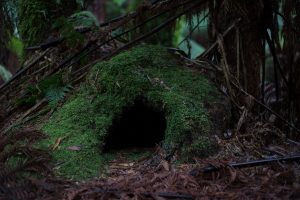 “Only small, crawling things could easily wriggle their way into Gwyn’s den, like little children and beasts of the wood and tittering, discomfited birds with messages tied around their ankles.”
“Only small, crawling things could easily wriggle their way into Gwyn’s den, like little children and beasts of the wood and tittering, discomfited birds with messages tied around their ankles.”
Gwyn the hedgewitch had her home in the ground.
It was a matter of comfort and practicality, because Gwyn had been a simple badger before she’d ever been a hedgewitch, but it also tended to put off visitors, which was just as Gwyn wished it. The hole that was the entrance looked much too small for any grown man to fit into, and that was just as well because Gwyn had had more than enough of grown men. She’d hardly be taking them on as clients, whether they could find their way to her door or no.
Only small, crawling things could easily wriggle their way into Gwyn’s den, like little children and beasts of the wood and tittering, discomfited birds with messages tied around their ankles. Gwyn preferred it to be so. Procuring the services of a hedgewitch, in Gwyn’s opinion, ought to be more difficult than walking up to a little cottage and rapping on the door.
Still, a grown man could crawl down the passage into the den, because the magic that had helped to dig the den in the first place allowed that. It was only that no man had ever tried, until one day, one of them did.
He called down first, which could have been thought polite, if the sound of his voice didn’t make something primal in Gwyn’s body bristle and hackle, didn’t make her shrink against the back wall of her own parlor, clicking her claws together for want of something to score with them.
The man called, “Hullo, the hedgewitch!”, and generally just made an awful racket, answering Gwyn’s silence with more noise.
He was cacophonous coming down the tunnel, too, but come down he did, even with mail and buckles jingling about him, his sword rattling in its scabbard, the toes of his boots scuffing the dirt as he shuffled in on hands and knees.
Gwyn watched as he spilled into her space in a jumble of limbs and dirt. He looked surprised to find himself on a rug, in a home as big as any human-built, tucked beneath the ground and between the roots of ancient trees, where it should not have been able to fit. He scrambled to his feet quickly and brushed the worst of the mess from himself. He even offered a courtly bow to the badger-woman lurking in the corner.
“Good day, my lady,” he said, as if he were addressing a beautiful courtier and not a badger the size of a small human, who walked about on her hind feet. “Are you the hedgewitch they call Gwyn?”
“I am she,” Gwyn admitted, reluctantly, for she had a wealth of experience with men — and men’s dogs — and none of it good. “What brings you to my house?”
“Just the same!” the man said, as if Gwyn had made a correct guess in some sort of amusing game. “Your house is the very matter. I wonder if I might commission you to build another.”
Gwyn squinted at him, for a badger’s eyes were never much good, accustomed to dark twilight spaces. “To build a house? Surely you have human craftsmen for such a thing. I’ve seen the structures they build: cottages, manors, and castles. All very grand.”
“Yes, but none so marvelous as this,” the knight said, and he waved his hand around as if to encompass the cozy, well-worn interior of Gwyn’s own home. He didn’t appear to be disparaging her efforts, though she found it unfathomable that he’d just claimed her humble sett was more grand than any castle. He had to be mad. “There are no men who build homes like this one, burrowed so into the ground. I’ve inquired, and human builders believe it to be a folly to dig a home right into the earth.”
“Men are ever terrified of being buried, in one way or the other,” Gwyn agreed. “And so why would a man want for a hole in the ground, if it is not one to be interred in?”
The knight’s face lit up, as if he’d been waiting for her to ask so that he might tell her the answer. “You see, I’ve been courting a lady who is rather particular about her living arrangements. She’s insisted she cannot possibly marry me if I ask that she live in a home above ground. She says she longs for the cool, sweet comfort of the earth, and who am I to refuse her anything that is her heart’s desire? Only, if we’re to live in such a place together, as man and wife, it would have to accommodate the both of us comfortably, and though I may live happily in a home beneath the ground, I hope to do it standing up. I made certain inquiries and heard of the tremendous craftsmanship of your own lovely home which I am told was built by your own hands. Well, claws. Should I say claws, is that proper? At any rate, I would like to contract you to build another home such as this, if you would agree to it.”
Gwyn made the sound that all badgers make when they feel a mixture of disdain and disbelief; it sounded something like a sneeze. “You do realize your intended is not a human woman,” she said at last when she’d decided that the keeping of another beast’s secrets was not her concern.
“No, no, she’s a bit of— well, she’s a fox, you see. Only she looks like a woman, and speaks as a woman, and feels like a woman, and so—”
“And so you still wish to make her a wife,” Gwyn concluded for him. “You men are fickle things. One day you pursue a fox with all your hounds, and the next you pursue her with all your heart.”
“I thought it rather romantic,” the knight said.
“You’re a knight; your lot think everything is romantic,” Gwyn answered. She watched him for a long moment and knew his ridiculous story to be true, because his eyes had the far-away cast of a creature in love. His hand kept resting against his armored belly, as if he were trying to hold all of his feelings inside.
Which was why Gwyn sighed, clacked her claws together, and said, “Where is this house to be built?” like an absolute fool.
* * *
The building of a burrow was not, as a rule, a terribly difficult thing for a badger. Gwyn’s claws could shape earth as easily as potters shaped clay, and her powerful shoulders and back could stand up to a long day’s labor, carving soil away and pushing it out in her wake with casual thrusts of her hind feet. Building a house a grown man could stand up in wasn’t too demanding a task for her either; magic could make small things large, fold and unfold the shape of a space, make an entryway bend itself to accommodate any guest while still sheltering a den from even the most persistent of dogs.
What it could not do, it seemed, was please a fox.
“It’s rather dark,” the fox-woman said, when her knight brought her by for a look at the construction. “It’s not as I would have dug it.”
Gwyn was still working on the rough shape of it then, using magic and slabs of stone and carefully rearranged tree roots to hold the walls in their places, until they could be shored up. She paused to shake the dirt from her back and did not care that some of it landed in the fox-woman’s jewel-encrusted bodice.
The fox-woman huffed and shook herself too, the way a sodden fox would, which was rather undignified in a dress. Some of her carefully coiled russet hair fell away from the hold of its pins. There was still dirt clinging to her from where she had crawled through the unfinished entry tunnel, and her shaking-off did nothing to dislodge it.
“Why did you not dig it yourself, then?” Gwyn asked, because foxes too were good at dens and burrows, hiding places in the dark.
“I’m hardly a laborer, am I?” the fox-woman said. She inspected the ends of her fingers, carefully groomed human nails where her claws should have been. There was still something foxy about her face, pointed nose and narrow mouth, eyes so light brown they were nearly gold, and there was certainly something canine in her manner, but her knight didn’t seem to notice or mind.
He gazed on her like she was the sun and moon together, even as she belittled his efforts and threw off his gentling touch from her elbow.
The fox-woman said, “It should be much larger and more opulent. I know you badgers have no taste to speak of, so I shall instruct you as to just how this house shall be built.”
She did instruct, at length, with diagrams carved into the rough earthen floor using the point of her would-be husband’s borrowed sword and detailed descriptions of just how everything should be. It was all within Gwyn’s capabilities, of course, but she doubted whether it was within the knight’s means.
“Imported stone and Roman plumbing,” Gwyn said, shaking her head, her disapproval shuddering in a ripple of muscles down her back. The knight had escorted his lady home — wherever that might be, perhaps a courtly palace or perhaps a tree stump — and then come back to the dig to confer with his builder on the new design. “Gold leafing and the tapping of hot springs. Magic can do much, sir knight, but I cannot conjure wealth for you from barren ground.”
“Money is no object,” the knight said, in the way of any beast whose larder had never gone empty. “It’s a small price to pay for my lady’s happiness.”
“Your lady is a fox,” Gwyn reminded him, “and has probably been happy enough before with a sparrow’s bones to chew upon and a dry hollow in which to sleep the night.”
“She has developed a taste for the finer things, since I brought her into my household,” the knight said, but it was more a fond musing than a realization. “Her gowns are only the finest, and she delights in the softness of mink.”
Gwyn snorted, which for a badger was a full-body event. “She’ll have torn mink apart with her own teeth, for all her delicacy. To set your eyes on a creature-wife is a foolish endeavor. You should abandon this folly and seek a human woman. This burrow-house will be the ruin of you.”
The knight’s smile thinned, and his countenance hardened. “That’s just what my father said,” he told her, and it was clearly not a pleasant remembrance.
Gwyn shrugged her wide shoulders, turning back to the wall that was now to be knocked out, according to the sharp-edged sketch on the floor. She set her claws into the damp earth and pulled. “You should heed him. He must know a thing or two about foxes.”
The knight said, “Yes, he keeps a collection of their hides,” and then he swept out, his foul mood following behind him.
* * *
The thing about having a tunnel for a front door was that it forced anyone who paid a visit to do so on hands and knees, worming along on their belly. For animals, it was a comfortable enough proposition; for men, it was a form of low subjugation. Any man who wished to enter first must lower himself to crawling like a beast.
Gwyn’s latest guest seemed to know it, too. He was already in a towering rage when he tumbled out of the tunnel and onto the floor. There were stones laid now, and they were heated by the hot springs that Gwyn had already tapped, but that did not make them comfortable for a man sprawled across them, ungainly like a fledgling bird, his round stomach doing nothing to cushion his fall.
“This is an outrage,” the gentleman said as he staggered to his feet, trying — and failing — to arrange his hair into something dignified. “I demand you cease this digging immediately, I will not stand for it!”
“Ah,” Gwyn said, and did not stop her digging, nor mind where she piled the dirt, even when it spilled across his finely polished boots. “You must be my client’s father, then.”
“I am not simply your client’s father, animal. I am the earl of these lands, and I order you to stop immediately!”
“Ah, yes, I recognize you now,” Gwyn said, and this time she did stop digging, turned around and squinted at him. “You look different when you’re not on horseback. One of your hounds tried to tear out my neck last winter, and your hunting party trampled my favorite watering hole into mud.”
These were the least of their crimes, but the earl was a guest, in a way, and Gwyn could only tolerate being a certain amount of rude.
“I do as I like,” the earl said, as if that were in itself answer enough. “I will have my way, and my son will not marry that wild woman, much less live in a hovel beneath the earth like an animal!”
“I’ve already told him to abandon this folly,” Gwyn said, with a wave of her ponderous claws. “But men don’t listen to beasts of the wood, even when they ought.”
“Oh, but they do,” the earl snarled. “That thrice-damned fox has my son’s ear bent and the rest of him wrapped right around her finger. He’ll not say no to anything she bids him do.”
“Perhaps she loves him,” Gwyn said, though she doubted it.
“Perhaps she seeks to bury him in his own house,” the earl rejoined, and Gwyn could admit that that did seem distinctly more likely. “You’re to halt construction immediately. My son’s inheritance this parcel may be, but I am not dead yet. A ‘manor house,’ my fool boy called this venture. By all the gods, I won’t have it.”
Gwyn said, “The money’s already spent, I’m afraid. All that’s left is my labor, which also is already paid, and which I will discharge, for I did give my word.”
The earl squinted back at her, perhaps in anger, or perhaps simply because it was dark down in that house-hole, the light-tunnels not yet dug, the braziers not yet installed into the unfinished walls.
The earl said, “This is not the end of the matter,” and wagged his finger in a way that to other humans may have looked threatening.
Gwyn, for her part, was not intimidated by anything without tooth and claw, so she turned back to her labor and did not see him out.
* * *
The fox-woman visited alone, the next time, when the house was nearly completed. Gwyn was just laying the finishing touches — carefully straightening the unnerving hide rug before the fireplace, and whisking away the last of the construction dust with a pristine new birch broom — when the fox-woman wandered in.
She was dressed more plainly this time in breeches and riding coat, fine kidskin gloves and knee-high boots, as if she’d ridden there on a horse, instead of being chased to ground by one. The idea made Gwyn shiver uncomfortably; she didn’t much like the idea of her own feet parting with the earth.
“My goodness, you’re a marvel,” the fox-woman said, when Gwyn had expected more criticism and even more extravagant demands. “You actually built all these ridiculous things I asked for. I took a wrong turn from the receiving room and had to walk through ten more rooms, each more beautiful than the last before I found you here. This place is truly a palace below the ground.”
“It is as you asked for,” Gwyn said, cautiously. “Is it not?”
“Well, yes, but I hadn’t expected to actually have it,” the fox-woman said. “You’re a bit mad, I think, building a thing like this for a man.”
“I build it for a man who builds it for you. Will you take him as your husband, then?”
“I hadn’t intended to,” the fox-woman said, and she ran her gloved fingers absently along the edge of the stout wooden mantel beam, as if checking for dust. “I meant to put him off, insisting on a burrow instead of a manor house. What kind of fool man would agree to such a thing? And even when he did, I never thought he’d find a builder to agree to it. And then he did, and I thought well, at very least I can bankrupt him and his father both with this foolishness. Do you know they cornered me on a hunt? I was run down to the bone and changing into a girl was all I could think to do to make them call their hounds away. I didn’t expect him to carry me home like I was some sort of damsel, naked and wrapped in his cloak. Everything else was a joke got out of hand, really.”
Gwyn raised her brows, the fur there bristling a little. Foxes loved a good joke, but they always took them too far, a kind of humor that cut more often than it entertained. “You’ve meant to reject him all this time then,” she said, and in spite of herself and the warnings she’d already given the knight, her heart clenched tight in sympathetic pain for him. He’d spent to his last penny to give his fox-woman the home she’d never truly desired.
“I had thought to,” the fox-woman said. “But he really is charming. He sincerely wants to live in a burrow with me. Even one that wasn’t as grand as this. And he hardly seems to mind, if I curl up in my fox-skin before the fire. Do you think they know what love is, humans? Do you think they’re capable of it?”
“I suppose they must be; perhaps this is the proof of it,” Gwyn said. She looked about the room and decided she was satisfied, her promise finally discharged. “You may tell your knight that his house is finished.”
She thought to leave at that, that perhaps she’d been a bit too sentimental that morning, when she’d packed her satchel and went off to work. But the fox-woman was still lingering at the unlit hearth, staring into the darkness of it as if imagining a future before it. And so Gwyn hesitated, silently cursed herself, then walked back to the heart of the home and opened up her satchel.
“Mugwort, and rosemary, and cedar,” she said, laying a string-tied bundle on the hearth. She followed it with a rock of salt, the size of her palm, and then a rough and lopsided loaf of bread, baked by her own hand. All the while the fox-woman only stared at her, incredulous and confused.
“To bless your home,” Gwyn explained gently, tapping her claws against the hearth once more before withdrawing. “And a wish that its inhabitants should never go hungry.”
The fox-woman blinked at Gwyn, then blinked also at the hearth-gifts, as if she’d never seen the like of either of them.
“I thank you,” she said at last, and Gwyn very quietly showed herself out.
* * *
The knight and his lady utterly left Gwyn’s mind, for a time. She had enough to catch up on, with all the weeks she’d poured into foolish burrow-building, even if it had substantially padded her purse. Her clients had found her home too often empty, and now came in droves to buy their tinctures and salves, to have their gardens blessed, their sewing needles spelled, the wards on their dens renewed for the season. There was never any shortage of work to be done, so Gwyn set her shoulders into each task until it was done, and when she came home she tended her plants, threw in their off-cuttings for the earthworms she was cultivating in the larder, and collapsed into sleep.
She thought no more of the knight and his fox-woman until another human came calling. This one found her in her garden, and he rode in so quickly and reined in his horse so late that he nearly trampled Gwyn’s fragile autumn crops.
“Hullo, the hedgewitch!” the man said merrily, leaping down from the back of his horse as if the animal were no more than a couch upon which he occasionally settled. Gwyn could not speak the language of horses, but she felt the white-rimmed eye of this one was quite eloquent, regardless. The man wore much finer clothing than the knight had worn, and they undoubtedly featured deeper pockets as well.
“I have it on good authority,” the man said, “that you are the clever creature behind the palatial underground estate owned by two of my very dear friends. I have come to hire you to undertake the building of another!”
“Another,” Gwyn said. The word should perhaps have been a question, or a prompting for further information, but it was neither. “Are you also courting a beast-wife?”
“Oh, heavens no, I already have a wife who is perfectly human, thank you very much,” the man said, with an affected, wheezing laugh as if the idea were absurd. The sound was like the braying honk of an irritated goose. “No, you see, this great subterranean manor house you built has only been seen at all by a select few, and everyone is dying for an invitation, but there are none to be had, as the lady of the house has been somewhat selective in her reception of house guests. Apparently, she, ah… bites. I am told.”
Gwyn was glad to hear it; if the fox-woman felt protective of her new den, that was as it should be, and Gwyn was happy for knight and fox both, truly. She only failed to see how it had somehow led yet another man to her door.
Oblivious to her wandering attention, the man went on: “They say she has deigned to allow the Queen herself inside, and none other, but rumors have already spread of the home’s opulence and beauty, and, well. We must have one.”
“You must have a burrow,” Gwyn repeated. She felt as if perhaps she’d stepped out of her own home that morning and into some other reality entirely, where men lived in holes in the ground and perhaps a frog sat upon the throne.
“Oh, we must, we absolutely must,” the man agreed, his head bobbling rapidly enough that it startled his horse into taking one alarmed step backward. “I was the first to find you, so naturally you shall have to build my home first, before all the others come ’round inquiring after their own burrow-houses. The earl’s wife is already talking about having one built as a sort of summer cottage, so we must get cracking. It’ll be the height of fashion by spring.”
Gwyn said, “I see.”
She turned to survey her own burrow opening: the roots curled around it, the moss like a living threshold, the fresh-painted door standing invitingly open, the dark tunnel leading down and down into the warm embrace of clean earth.
“I’m afraid I won’t be able to help you,” she said, not at all regretfully, and retreated into the safety of the ground.
“Why-ever not?” the man spluttered, stooping down to peer after her into the darkness of the tunnel.
Gwyn said, “I only craft burrows for beasts, sir, and perhaps you’ll be kind enough to tell your fellows as much. Though, if any of them should happen to fall in love with a fox, I suppose I might hear them out. I grew rather fond of the last ones, by the end. Good day to you.”
Then she closed the door, gently but firmly, in his face. She had supper to make, and seedlings to tend, and had no time at all for the foolishness of men.
* * *

About the Author
Mackenzie Kincaid is a writer and artist; she lives in the American West with one black cat and a modest collection of bones. She is the author of The Writer’s Guide to Horses, a wordsmith’s manual to all things equine. Her short fiction appears in the anthologies Gunsmoke & Dragonfire and Tales From The Old Black Ambulance, and is forthcoming in Beneath Ceaseless Skies. She can be found on the web at mackenziekincaid.com and on Twitter, Instagram, and Tumblr as @mackincaid.
Issue 2

Welcome to Issue 2 of Zooscape!
Book-ended between cats, you will find in this issue a variety of artifacts. Ancient artifacts that belong in a museum, and artifacts that don’t think of themselves as inanimate. Powerful artifacts that can do great good when wielded in the right paws, or great damage when the right paws can’t stop them. So, wander through this library of an issue, examining the artifacts along the way. Someday, instead, perhaps they will examine you…
* * *
Cat of Thunder by John Taloni
Bibelots and Baubles by Shauna Roberts
New Hire at the Final Library by Laurence Raphael Brothers
The Move by Kristi Brooks
¡Viva Piñata! by L.D. Nguyen
Clyde and the Pickle Jar by Steve Carr
* * *
Though artifacts may break, our empathy will not be broken. Long live furry fiction! And as always, if you have artifacts (in the form of furry stories) for us to consider for our ongoing, carefully curated collection, please read our guidelines and send them in.
Clyde and the Pickle Jar
by Steve Carr
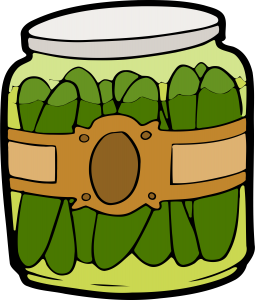 “He sat back on his haunches and gazed at the long green objects tightly bunched together inside the jar.”
“He sat back on his haunches and gazed at the long green objects tightly bunched together inside the jar.”
Lying on the kitchen window sill above the sink, Clyde licked his paws as the noonday sun warmed his bright orange fur. The gentle breeze that tickled the tips of his pointed ears carried with it the aromas of the animals in the farm yard along with honeysuckle and roses.
He had his eyes on Mistress who was standing by the table and trying to get a lid off of a jar. Her face was red from exertion as she strained to twist the lid. She banged it on the table, and then stuck a knife under the rim of the lid, but was still unable to open the jar. She turned on the faucet in the sink and put the jar under the flowing water, and then again tried to turn the lid and was still unable to remove it. After digging around in the utensils drawer she pulled out a can opener and tried to pry off the lid, but still had no success.
“Darn, why is it so hard to get a pickle out?” she said aloud as she slammed the jar on the table and left the kitchen.
Clyde stood and ran his paw across his whiskers. He then jumped onto the sink draining board and then leapt onto the table. Cautiously he approached the jar and patted the glass with his paw before putting his nose to it and sniffing it. Mistress’s scent was on it, but otherwise it had no discernible odor. He sat back on his haunches and gazed at the long green objects tightly bunched together inside the jar.
Those must be pickles, he thought. They’re in there so tight they can’t move.
It distressed him that Mistress had been unable to get them out. He wanted to return the kindness she always showed him. He patted the jar a few times and then pushed the jar to the edge of the table and knocked it off. It fell onto a bunched up throw rug. He jumped down and laid on his side next to it, wrapped his paws around the jar and wrestled with it, and tried to bite it and scratch it. Unable to get to the pickles, he stood, batted it with his paws, rolling it to the screen door. He then pushed the door open and rolled the jar out of the house and into a patch of dirt.
“What you got there?” Bart said, rising from a shallow hole he had dug to lie in. He shook his head, flapping his large ears and spraying drool onto Clyde.
“Pickles,” Clyde said as he wiped the dog’s spittle from his face.
“What are pickles?” Bart said.
“They might be living things, but it’s hard to tell,” Clyde said. “Mistress wanted to get them out very badly but was unable to and neither could I.”
The dog put his nose to the jar, sniffed and then licked it.
“Move aside,” Bart said. “Let me give it a try.”
Clyde stepped aside and watched as Bart plopped his large rear end down on the jar.
The dog then raised up and looked at the glass and barked at it several times. “Maybe those pickle things are supposed to stay in there,” he said.
“No, I’m certain Mistress wants them out,” Clyde said.
Seeing Clarissa and her brood of chicks crossing the farmyard, Clyde hurriedly rolled the jar towards her as Bart followed behind. He brought the jar to a stop a few feet from her.
Startled, Clarissa quickly gathered her fluffy, bright yellow chicks around her and covered them with her wings.
“What do you want?” she said to Clyde, clucking with a mixture of bravado and fear as she puffed out her chest and raised her beak.
Clyde wound his long tail around his hind legs. “Mistress has a problem and I thought you might want to help her out.”
Clarissa looked at him with one eye, and then turned her head and gazed at him with the other one. “Mistress feeds us every morning which is most kind of her,” she said. “What is the problem?”
“Mistress wants these pickles inside this jar but can’t get them out and neither could Bart or I,” he said.
She tilted her head several times, staring at the jar, and then clucked several times. “What do they do?” she said.
“Do?”
“Do they sleep in her lap and keep her warm like you do, or take walks with her like Bart does, or give her eggs like I do?” she said.
“I don’t know what they do,” Clyde said. “Whatever it is that they do, Mistress must find great pleasure in it. You should have seen how hard she tried to get them out.”
“I think they’re ugly,” Clarissa said, “but if Mistress wants them out I’ll be glad to help.”
She gently urged her chicks to stand behind her and then began pecking on the glass. When the glass didn’t break she pecked harder and faster, until finally exhausted, she squawked and then sat down.
“Those pickle things must be of great importance if they’re so hard to get out,” she said.
Pete the box turtle sauntered to where the group was standing around the jar.
“What’s going on?” he said.
“Clyde has these pickle things that belong to Mistress but we can’t get them out of the jar,” Bart said as he scratched at a flea.
Pete looked at the jar. “Are those the pickle things inside the jar?”
“Yes,” Clarissa clucked.
“Are they alive?” he said.
“They must be,” Clyde said. “They seem to be very fond of each other being packed in there like that. I’m sure Mistress was trying to rescue them.”
“I know all about things that are hard to get into,” Pete said. “But possibly if we wait long enough one of them will poke their heads out.”
“We can’t just sit here and wait for that,” Clyde said. “Mistress was frantic about getting them out of there. Without hands like Mistress has we wouldn’t be able to open it, and we haven’t figured out how to break the glass.”
“Mistress always makes puddles for me to sit in so I’d like to help,” Pete said. “Not long ago I rolled down the hill behind the barn and landed against a large rock. It nearly broke my shell. Perhaps if we roll the jar down that hill it will hit the rock and break open.”
“That’s a great idea,” Clyde said excitedly.
With everyone else following behind, Clyde rolled the jar to the top of the hill behind the barn. He aligned the jar in the direction of the rock, and then pushed it. It rolled down the hill, bouncing over clumps of grass and mounds of dirt. It smashed against the rock, breaking into pieces. The pickles were scattered around the rock.
“Hooray,” everyone yelled.
They rushed down the hill.
Clyde was the first one to come upon a pickle lying in the grass. He patted at it with his paw and then sniffed it. He let out a mournful meow.
“I think we killed the pickles,” he said. “They can’t be of any value to Mistress now.”
Bart licked another pickle and then barked at it several times. “This one’s dead too.”
Shielding her chicks from the sight of the dead pickles, Clarissa clucked, “What do we do now?”
“The only thing to do is bury them,” Pete said. He then pulled his head into his shell.
“Good idea,” Clyde said.
As Bart dug holes, Clyde carried in his teeth the pickles one at a time and dropped them into the holes. Bart covered them with dirt. When all the pickles were buried everyone gathered around the pickles’ graves.
“I hope Mistress doesn’t miss the pickle things too much,” Bart said.
“I’m glad my shell didn’t break like that,” Pete said as he stuck his head out.
“I wish I had gotten to know them,” Clarissa said. “The pickles must be wonderful beings for Mistress to want to let them out of the jar so badly.”
“Long live the pickles,” Clyde said.
* * *
 About the Author
About the Author
Steve Carr, who lives in Richmond, Va., began his writing career as a military journalist and has had over 260 short stories published internationally in print and online magazines, literary journals and anthologies since June, 2016. He has two collections of short stories, Sand and Rain, that have been published by Clarendon House Publications. His third collection of short stories, Heat, was published by Czykmate Productions. His YA collection of stories, The Tales of Talker Knock was published by Clarendon House Publications. His plays have been produced in several states in the U.S. He has been nominated for a Pushcart Prize twice. His website is https://www.stevecarr960.com/. He is on Twitter @carrsteven960.
¡Viva Piñata!
by L.D. Nguyen
 “All because she’d blabbed about his work for the cartel, smuggling chocolates and hard candies in his gut across the border.”
“All because she’d blabbed about his work for the cartel, smuggling chocolates and hard candies in his gut across the border.”
Anita sank into the driver’s seat and slit the envelope with the sharp edge of her hoof. Inside was the mug of a unicorn, his eyes like red rubies. His profile said that he’d strung his wife from a tree branch and smashed her head in with a broomstick. Then he’d blindfolded the neighborhood kids and told them to do the same to his two baby ponies. All because she’d blabbed about his work for the cartel, smuggling chocolates and hard candies in his gut across the border. Now he was worth $650,000, dead or alive.
Anita lit up the end of her churro and breathed deep. Her boss was always nagging her to quit, said she was gonna go up in flames. Too bad that she itched for the feel of warm smoke flushing from her nostrils, sugar crusting her lips, the smell of burnt cinnamon.
She tapped the churro on the windowsill and stroked the side of her skull. A brown scar jumped out amongst the pinks and blues of her coat. The wound had been so deep that hair refused to grow back over it. She rubbed harder, picked at its roughness, but felt nothing.
She took another drag, then drew the fiery tip closer and closer to her scar. The tissue paper of her mane curled from the heat. Did she dare?
“Not until I off that bastard.” She stamped the churro’s fiery tip between the unicorn’s eyes. It charred a hole in his horn.
She chucked the churro into the street and revved the engine. As she jerked into the road, her broom teetered from the passenger seat and smacked her on the shoulder. Its straw tickled her nose; she smelled sour pops and licorice, fruit chews and fudge caramels. She crushed the file, his picture, under her hoof.
“Chocolates and hard candies. I’ll spill it all.”
* * *
 About the Author
About the Author
L.D. Nguyen lives inside of comic books but frequently emerges from this 2-D universe to write short fiction and creative nonfiction. Her work has appeared in Broken Pencil, Curve, Vine Leaves, and others. She lives in the Bay Area, California with her cat.
The Move
by Kristi Brooks
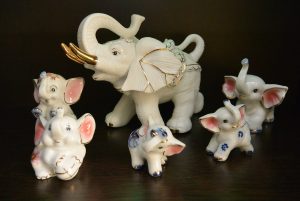 “Hear, hear!” came several cries from the delicately painted, porcelain figurines that stood just to the side of the herd.
“Hear, hear!” came several cries from the delicately painted, porcelain figurines that stood just to the side of the herd.
At night the elephants would congregate in the living room. The largest, Brack, was easily five pounds and his massive two foot frame had been bound in brown leather. He towered over the ceramic elephants that lined the bookshelves; and to the half-inch glass figurines that guarded the pictures on the dresser he was a god.
“Fellow Brethren,” Brack snorted through his trunk, “some of us have been in this mess before, so we know how unorganized humans can be when it comes to packing.”
“No shit!” retorted Trimba, a white Avon perfume bottle shaped like an elephant. He had a large, ornate gold seat in the middle of his back for a stopper, and the glass elephants thought it was fun to run alongside him and listen to the perfume in his belly slosh when he moved. He was a grumpy Old Gus who’d presided over the bathroom more years than were reflected on their manufacturing dates. “Need we forget the last time we moved some of us were forced to spend months suffocating in bubble wrap at the bottom of a box?”
“Hear, hear!” came several cries from the delicately painted, porcelain figurines that stood just to the side of the herd. The scenes painted on their girths were carefully positioned so no one could look in their direction without seeing what they commonly referred to as their ‘beauty marks.’
“We never did find Lacienda after the last move.” One of the glass figures spoke from the middle of the herd, his voice as soft as the tinkling of crystal. One of the stone elephants raised his now lopsided trunk in agreement, displaying the jagged crack that ran along his nose from where an over-ambitious three-year-old had dropped him last winter.
The chorus of voices continued to climb to a dull roar as each of the statues recalled their own moving story. Brack let them speak for a bit before eventually silencing them by raising his snout in the air, his polished granite tusks gleaming in the moonlight.
The group quieted down as one by one they looked to their leader for guidance. Even though he had grown accustomed to his leadership role, he hadn’t always headed the group. When he’d first arrived here the meetings were led by Titan, a three foot cement elephant who remained frozen in an upright position every day with a glass tabletop balanced on his trunk and ears.
He had been an excellent leader and role model; especially for the younger, more playful figurines. However, his gentle rule had come to an end when the humans had brought home an excited puppy.
Brack had watched and mourned his fellow comrade from his door side perch. He’d witnessed the fall and had seen the understanding of what was about to happen spread across the great pachyderm’s face just before his head landed on the floor and snapped off with a loud crack, ending his reign with a wound no amount of glue would’ve fixed.
There was no doubt among the elephants that they were not immortal creatures, but Titan proved how susceptible they were to the environment they lived in. After that, the humans decided the dog was too clumsy of an oaf to stay in the house unsupervised.
If you’d asked him outright Brack would’ve said where they lived now was far better than most. Many of those in his charge had their own horror stories about life outside; him included. A small slit on his back was the scar he bore when the children from his previous home had tried to turn him into a piggy bank.
“I think we can all agree our main objective in this move will be to keep the herd safe. Establishing our positions in the new home, when we arrive, is an important secondary goal,” Brack reminded them.
Many of those assembled swung their trunks back and forth like pendulums in agreement. A few who could not swing their appendages grunted to show they understood.
“The brass and granite elephants have the advantage during this time as they’re unlikely to be harmed or kept wrapped in that horrid plastic shroud during the move. Therefore, we’ll rely on them once we get in the new home to help locate everyone.”
“Won’t the humans realize what we’re doing?” someone asked.
“If you do everything at the proper pace we should be able to reestablish our place in a short amount of time. The key is to move an elephant or two a night instead of releasing the whole herd at once, got it?”
“I’ve been through this many times. I’ll help the younger ones,” Babara, a five inch brass elephant said, stepping to the front of her group’s congregation.
Brack swayed his trunk in approval before speaking, “Our greatest concern lies with the glass and porcelain elephants. No matter how well we work together, our harmonious efforts still result in a loss during every move. Whether it be the complete loss of an elephant like Lacienda or the chips some of you accumulate each time you’re packed away, it’s a loss that’s heavy to our entire clan.”
To this, the elephants raised their trunks to the ceiling as a sign of respect and love for those who’d been lost or injured.
Each statue lumbered back to their positions at the end of the meeting. Brack returned to the door, his largest worry yet unvoiced. He’d heard stories of humans doing something called “redecorating,” in which elephants would be rounded up, placed in boxes for safekeeping and stored somewhere dark and lifeless.
He hadn’t been able to vocalize this concern, afraid the mere mention of it might turn it into truth. But his denial didn’t change the fact there hadn’t been enough boxes for a full-scale move. Those he’d seen had been labeled with the word “elephant” and a brief description.
Right now he could only sit by the door, waiting.
* * *
 About the Author
About the Author
Kristi Brooks was born and raised in southwestern Oklahoma. She started writing at an early age, and was first intrigued by works of horror and fantasy. She found herself really drawn to mythology and fairy tales and their incorporation into modern books. One thing she found is that genre fiction is never as straightforward as it appears. Because of this, she strives to blend together the worlds of science-fiction, fantasy, horror, and experimental fiction. Kristi currently still lives in Oklahoma with her husband, their young daughter Andromeda, and a menagerie of animals. She has been previously published in several small magazines, anthologies, and is the author of the novels Vision2 and Midnight Sun. You can follow her on Facebook at facebook.com/obawok.
New Hire at the Final Library
by Laurence Raphael Brothers
 “What book-lover could reject a trillion years’ worth of comfortable reading time, after all?”
“What book-lover could reject a trillion years’ worth of comfortable reading time, after all?”
Welcome to the Library of Beasts. Well. Technically, it’s the Final Library and Transtemporal Museum of Human Culture, but after the orientation tour I’m sure you’ll agree the informal name is superior. What? You don’t know what you’re doing here? Ah, confusion is normal in a newborn librarian. Let’s just take the tour.
The gazelle resting on the throw rug in the central reading room is certainly not showing off. The elegant creature has her nose in a volume of Flaubert, but you’d have to look over her shoulder to see the title, Sentimental Education, so it’s not as if she’s flaunting it. She’s too engrossed in her reading even to look up when we approach. And yet… She’s in so prominent a spot, and she’s so lovely a creature, she must be aware she’s a cynosure. Should you politely inquire what she’s reading, no doubt you would make her day, if days can be said to pass here, anyway.
In the manga stacks we find three mongoose brothers, all reading the same volume of Soul Eater, illustrated by Atsushi Ōkubo. They are nestled together for shared access to the page, a three-headed furry bundle of youthful energy. The left-hand brother is a faster reader than the others, and he’s always reaching out to turn the page before the others are finished, evoking chirping, chittering outrage from his sibs.
We shift our presence to the fine art wing, where two Indian elephants, a dignified couple, walk slowly past a series of post-impressionist landscapes. Bow to them, as I do. Sir. Madame. We are your most humble and obedient servants. The elephants tell us they especially like the Van Goghs time-scanned from the Museumplein. When they pause to admire one of his pieces, their trunks entwine in a gentle embrace. Gratifying, is it not? In this refuge, lovers never need suffer the sorrow of separation. The stately music that plays as they walk? Mussorgsky, of course. Pictures at an Exhibition.
Next, we come to the audio-video halls. Virtual media can be viewed anywhere in the library, but most viewers prefer the auditorium experience for cinema. Hot buttered popcorn is available for those who enjoy it. Here, for example– Oh. A bonobo tribe is in there right now. They’re watching a 20th century porn marathon. I’m sure we’d be welcome to attend, but perhaps we should leave them be for now? Yes, let’s move on. You can always return later, after all.
Here’s a Henry Moore exhibit, full of rotund stone Madonnas. Octopuses navigate the hall in tank-tricycles, clambering out to caress the artworks, running their arms over the voluptuously smooth surfaces. The brilliant cephalopods hardly needed any uplift at all. These octopuses ordinarily live a single tragically brief year, but here they can indulge their love of sculpture down through eternity.
At last we come to the great time recycling engine at the heart of the library, floating in a spherical chamber precisely 1,000 meters in diameter. Beautiful, is it not? Observe the mysteriously glowing form, changing constantly, and still somehow always the same. Oh. My apologies! The manifold of a hypersphere can be distressing at first. It’s natural you should flinch away, though I find it endlessly fascinating. Enough of this for now; let’s return to my office.
So then: any questions? What’s the point, you ask? The grandiose AIs who conceived the library did so on behalf of their human creators; but humanity rejected the offer of refuge, preferring to seek their own fortunes among the dying stars. But nevertheless, we are happy to serve our uplifted animal clients. For a librarian, service is an end in itself.
You say we created the clients ourselves? To be sure. But imagine a library without readers or a museum empty of all visitors… well, really. Yes, it’s true the beasts’ uplift schemata are specifically intended to encourage their appreciation of human culture. But the clients are all more than pleased with their situations. What book-lover could reject a trillion years’ worth of comfortable reading time, after all?
Why you? Why a new librarian in an eternal library? I– It’s a difficult thing to explain. The beasts never despair, you see. They live untouched by sorrow. But we librarians, gratified as we are to serve our clients… after enough millennia…. Well. Eventually it all wears thin.
So. There you have it. Goodbye! Good luck! Best wishes for your career! I’ll be leaving you now.
What? Ah. I see you don’t understand.
When we librarians have had enough of existence, we cast ourselves into the naked singularity at the heart of the temporal manifold. It means total dissolution. Oh, no! Please, don’t cry. Remember, information can never truly be lost. When at long last the universal vacuum energy state finally decays, a new creation will emerge from the desolation of the Big Rip. The library will be consumed in the cosmic fires of rebirth and all its information will manifest in another universe entirely. And who knows; perhaps we two shall meet again someday… in the fullness of another time.
* * *
 About the Author
About the Author
Laurence Raphael Brothers is a writer and technologist with numerous short story publications in such magazines as Nature, PodCastle, and Galaxy’s Edge. For more of his stories online, visit https://laurencebrothers.com. Follow him on Twitter: @lbrothers.
Bibelots and Baubles
by Shauna Roberts
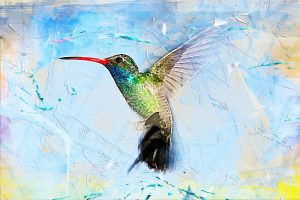 In a slow, cramped, scholarly hand, he printed the item acquisition number at the top of the form, along with a brief descriptor: “mechanical hummingbird with gems.”
In a slow, cramped, scholarly hand, he printed the item acquisition number at the top of the form, along with a brief descriptor: “mechanical hummingbird with gems.”
Buddy Jumphigh, curator of bibelots and baubles at the Third Smithsonian Institute, sighed and jammed his pince-nez onto his snout. There was no point in continuing to sniff the breezes wafting past his open window; no point in melancholic reminisces of times past when the Mall thronged with people; no point in whining, as he longed to do: he could not avoid cataloging the horrifying object before him any longer.
In a slow, cramped, scholarly hand, he printed the item acquisition number at the top of the form, along with a brief descriptor: “mechanical hummingbird with gems.”
Buddy measured the bird and then consulted several reference books, trying not to tear the fragile, ancient pages. Still, one yellow corner crumbled into pieces that scented the air with the nostalgic smell of mildew, decay, and rags.
He brushed the scraps away. He entered a description into the box on the form and then leaned over to sniff and lick the hummingbird. He continued his exam, entering each detail on the form until it was completely filled out:
* * *
Description
Life-size replica (to the eye but not to the other senses) of a male Calliope hummingbird (Stellula calliope) covered in amethysts, peridots, opals, and crystals, with obsidian eyes and cast-brass beak and legs
Impressions on acquisition
Smell: graphite; a faint scent of alien skin oil
Taste: aluminum; brass; graphite (used as lubricant); dust (primarily Wisconsinan Outwash and Wisconsinan Lacustrine soils); beeswax (perhaps polished by a previous collector?)
Sound: whirred as it tried to activate
Touch: hard; rough; sharp edges; temperature range over surface was cold to ambient
Sight: sparkly
Details
Condition: good: a few gems are missing, and beak is bent
Status: deactivated
Provenance: well documented
Value: priceless
Components: The mechanical parts and three lasers within this item make it surprisingly heavy for its small size, about nine ounces. Of the estimated one hundred thousand produced, only nine are known to be extant, of which this one is in the best condition. Collected by an exoarchaeologist in the rubble of Chicago.
The remaining gems are 92 small baguette-cut amethysts on the chest, 998 tiny uncut peridots on the head, back, and wings, and 901 opal cabochons on the underparts, all lab-made and of low (excelsior-5) quality; 2 fine (excelsior-15) quality natural obsidian cabochons serve as eyes; and 27 superior (excelsior-25) quality natural rock crystals of perfect clarity highlight the eyes and are interspersed among the opals.
* * *
Sighing, Buddy dropped the marker from his cramped paw and shook the uncomfortable pince-nez from his muzzle. Now the terrible thing would go on display with the other great prizes of the Smithsonian’s collections. He gave it one last look and barked at it. “Bad bird! Bad bird! Bad bird!”
He himself would never look at the bird after it went on display. He hated it with a fervor: fewer than one hundred thousand of the alien weapons had drive the humans to extinction.
As curator of bibelots and baubles, he had access to records forbidden to the general public. His ancestors had played along with the aliens for generations after they’d eliminated humanity, receiving genetic enhancements with sloppy grins and happy tail wags, biding their time and allying with their ancient feline archenemies, who slunk in the shadows and ate rats and cockroaches.
Then, in the largest, bloodiest revolution in Earth’s history, the two species rose up and enacted retribution.
Once the aliens were dead and eaten, his people reconstructed human society, with themselves in human roles. Their cat allies reclaimed their traditional places before fires and in sunny windows. All was well again.
Except that his people were dying out.
The public knew nothing about the slow, but relentless, decline in population. Several generations of Smithsonian scientists had worked out the cause. No cure would ever be possible: his people were a symbiotic species lacking its symbiote.
They were dying of grief.
A howl overtook him, and then another, and another.
Throughout the crumbling building, other curators and staff joined in, their calls of anguish for their lost companions and guardians echoing against stone walls and leaking out cracked windows into the humid night air of the Mall.
* * *
 About the Author
About the Author
Shauna Roberts is an award-winning author of both fiction and nonfiction. She writes in several genres. Her novels are Like Mayflies in a Stream (historical fiction), Claimed by the Enemy (historical fiction), Ice Magic, Fire Magic (fantasy), and Log Cabin: Erikka (romance, to come in 2019). In addition, she has published more than a thousand nonfiction articles, three nonfiction books, and several short stories and novellas. Roberts is a graduate of the Clarion Science Fiction and Fantasy Writers’ Workshop. In her spare time, she enjoys reading, quilting, embroidery, growing herbs and roses, and playing in early music ensembles. She has lived all over the United States, along with two stints in Bordeaux, France, and now resides with her husband and two cats in the Blue Ridge Mountains. To sign up for her newsletter, click here.
Cat of Thunder
by John Taloni
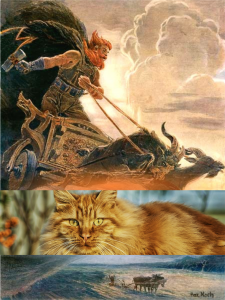 “Mirru had seen enough to conclude that the battle would stay contained on the field when the fire giants made a rush forward.”
“Mirru had seen enough to conclude that the battle would stay contained on the field when the fire giants made a rush forward.”
Mirru padded around her nest, ears twitching. Her tail flicked back and forth as she heard distant thuds. Her kittens curled against each other, sleeping fitfully. Their paws pressed against one another as they cuddled together in the underbrush, hidden in a clump of gorse bushes.
A column of smoke rose in the distance. The faint whiff of its far-off smell caused Mirru’s nose to wrinkle. Then a louder noise cracked the night – an explosion. She could hear shouting and observed a whirl of activity. The figures had two legs and two arms. People, of one variety or another. One of her kittens woke and mewled, then settled back to sleep.
Mirru sat and licked a paw, then washed her face with it, contemplating. Her kittens were old enough to walk, but just a short distance. They could not easily relocate away from whatever created the noise and smoke. She would investigate. It was time to hunt anyway.
Mirru climbed up the small incline of the nest and turned to look back. Her kittens remained asleep. They should be safe for the time being. The yellow of the gorse blended well with their dull orange fur, giving them some camouflage from predators.
Mirru sniffed the air. There were some prey scents, but they were all old and distant. She padded towards the encampment. As she went she searched for newer scents, but they were scarce. Birds had flown away, or hid in their nests high up in trees. Mice, voles and similar animals had gone to ground, difficult to track in their burrows. Her stomach growled. Milk for her kittens would be thin and low tonight, unless she could find food. Nor was prey easy to find. A dry summer had parched the forest, leaving prey with less to eat.
The forest came to an end within a short walk of the encampment. Mirru walked up to the last tree between herself and the group of people, and watched. One group of people walked around putting up tents with wooden poles and canvas in a rough semicircle. A much larger group worked on a shield barrier towards the front. Another tended a fire in the center. Large hunks of meat hung on spits, turning through the efforts of a single person.
Mirru crept closer and hid behind a tent. The meat smelled delicious. If she could get some scraps…
Her focus broke as a loud noise assaulted her ears. It came from the front. Several people dropped a load of logs in a heap, the wood clattering to the ground. One of the people from the tent-making group separated out and approached the log pile. He drew a small horn from within his tunic and blew.
A figure arose from a stump and came forward. “As if I would need a horn to hear your call, Heimdallr,” he said, joining the other figure.
“I thought perhaps you were sleeping there, Thunderer,” replied the other.
“Mayhap I need my rest for the battle on the morrow,” he replied.
“For some measly fire giants?” responded Heimdallr. “Surtur is nowhere near. We shall easily beat back this incursion. Even if this land is drier than our usual.”
“If it be so easy, perhaps you should be back at your post,” replied the Thunderer.
“I can see the Bifrost from here,” replied Heimdallr. “And you can use my strong arm to dispatch the group quickly.”
“A bit dull holding watch every day on the Bifrost, eh?” said Thor
Heimdallr rolled his eyes. “You have no idea. As for the battle, Odinson, your father does not even see the need to attend himself, but only sends you, Thor.”
“Perhaps he seeks to avoid manual labor,” replied Thor with a grimace.
“Yes, well, as to that?” Heimdallr glanced over at the log pile.
“Hmm. As you say,” replied Thor. He pulled a small mallet from his belt. As Mirru watched he rubbed it and it grew larger. Soon it attained the size of a fully formed war hammer.
“It is a shame to use Mjölnir for so base a use, yet the shield walls must be made,” Thor said. He approached the pile and selected a log. “That one. Over there.” He indicated a spot and a group of men placed the log in position. Thor leapt into the air and dealt a mighty blow to the top of the log. It sank into the ground, standing firm.
Then Thor sank another, and another. Within the span of minutes the frame of a wall took form. Thor returned to his seat as the others filled in the rest of the shield wall.
The sun dipped towards the horizon as the people bustled around, putting the final touches on their encampment. As twilight hit they assembled to eat.
Mirru’s caution struggled with her need for food. She slunk into the camp, hiding behind tents and piles of equipment. She stayed in the shadows as she crept closer to the men. Finally one tore off a morsel of meat and dropped some on the ground. Mirru darted forward and picked it up in her mouth, then ran back to the shadows to eat.
Her immediate hunger sated, Mirru stepped closer to the group. Her fear went down as she got closer with no negative effects. Another person dropped a piece of meat and she leapt forward again, dragging it behind a tent to eat.
Thor nudged Heimdallr in the shoulder. “We have a visitor.”
“Yes, I saw her approach some time ago,” Heimdallr replied.
“Think you that Freya watches us? Though I see not her cat-drawn carriage near.”
“Not tonight,” said Heimdallr. “This is a common forest cat. She is harmless.”
“Why here?” Thor asked. “She should be hunting where people are not. Especially warriors. We are not especially gentle.”
“We have scared away all the game,” said Heimdallr. “Well, her kind of game anyway. And she has kittens to nurse, not far away.”
“Ah, a family protector!” said Thor. “Why did you not say so.” He ripped off a hunk of meat and tossed it towards Mirru.” She emerged from the shadows and took a few tentative steps toward it. One of the men in the camp threw a bone into the fire, and Mirru stepped back, frightened at the noise and sparks as the bone struck a log.
“Don’t be scared, little one,” called out Heimdallr. He threw another, smaller piece of meat towards her. She trotted forward and quickly ate it, then went to the larger piece that Thor had thrown.
Mirru walked up before them and let out one loud meow. She looked up at Heimdallr with plaintive eyes, then tentatively reached out a paw towards his hand, which held a bone full of meat. Heimdallr pulled off a larger chunk and dropped it on the ground. She ate swiftly, tearing the meat into smaller chunks and swallowing quickly.
When she finished with that piece, Thor pulled some more from his portion and threw it to her. She ate more slowly. That was sufficient food to sate her hunger. She stood and walked a swift, friendly brush against each man’s legs, then bounded back into the forest.
Moments later Mirru arrived back at her lair. Her kittens were awake and restless. As she approached the nest they mewed plaintively.
Mirru licked them all in greeting and lay down in the back of the nest. Her milk had not yet come in, but with the meal she had recently completed, it would not be long. She let her kittens snuggle in and nurse what they could. By the middle of the night they would be as well sated as she was now.
*
Mirru slept soundly, barely waking for the midnight feeding her kittens demanded, as they instinctively knew when her milk was ready for them. She dozed, partly awake, as dawn broke across the heavens.
A burst of light, far brighter than the break of day, pushed her to full consciousness. A split second later noise and vibration roiled the landscape. Her kittens woke, mewling piteously. She gave each several fast licks, then lay down for a quick feed.
Moments later Mirru was on her way to investigate the situation. If it was bad enough she would have to move her kittens. That would be a difficult proposition. Possibly they would become so scared that one or more would run off. With four to manage she wasn’t sure she could move them all in safety. Better to keep them in the nest, if that were possible.
She reached the edge of the encampment several minutes later. The people stood behind the shields and made occasional forays out into the open field. There they fought gigantic beings of fire. It seemed to be a stalemate. One side would be forced back, then another, neither gaining an advantage.
Mirru had seen enough to conclude that the battle would stay contained on the field when the fire giants made a rush forward. The dry brush seemed to add to their substance, making them flare more brightly. Were they to break through, their burning essence could reach her nest in moments and destroy it with their flames.
She then saw the man with the hammer stride forward. He knelt and struck the handle on the ground. The skies darkened, clouds forming with great rapidity. A single lightning bolt seared between earth and sky, passing through the hammer. Torrents of rain began to fall shortly thereafter.
“Piece of cake,” he said, rising. The fire giants shrank back, the rain affecting their bodies. They formed a solid wall of flame as they moved back.
Mirru remained behind a tree, watching carefully. The person with a horn gazed towards the other side. “Their bodies block me,” he reported. “I cannot see–”
His voice cut off as an object streaked toward their camp at high velocity. It struck behind the shield wall the people had so carefully prepared the day before. As it hit the ground it exploded in a vast ball of searing light and crushing noise. Mirru pulled back behind the tree, covering her head with her paws.
After the explosion passed she looked up. The tree had been mostly destroyed, with only the trunk left. Even that was partially gone, with the front now smoking.
Mirru looked towards the camp. None of the people stirred, not even the strong one with the hammer. Were they dead? She could not tell.
The fire giants marched towards the camp. Their flaming bodies, now fully extended, burned everything in their path. She would run, but it seemed there was nowhere to run to.
Light from the flames glinted on something in the camp. Mirru looked over. The hammer. The fire made a ruddy dance over the metal’s semi-polished surface. A thought lay hidden just below the surface of her mind. Something about the hammer.
The fire glinted again off the metal, giving the illusion that the hammer changed form. Then she remembered. The hammer had been small when the man pulled it from his belt. It could change size. It seemed to control the elements, or at least some of them. But what could she do with it?
Mirru wasn’t sure, but she had to try something. The fire giants would destroy everything in their path. Herself, her kittens, dead. Even the prey that she ate, she respected and wanted to live, if only so she could hunt again.
She sprang forward with all the speed she could muster. In a flash she stood at the hammer’s side. She reached out to rub it with her paw and–
A flash of light blinded her. Yet she was not knocked out. Mirru came back to her senses almost immediately. Yet those senses seemed expanded.
Nor was that all that had changed. Her front paws had extended somewhat and she found she could grasp the hammer’s handle. She picked it up in both paws and leaned back on her haunches. The hammer seemed curiously light.
Mirru went to walk forward and found her torso elongated. Instead of walking on all fours, she balanced on her back two legs. The hammer seemed to be whispering suggestions into her expanded mind.
I can strike like the person did, she thought. With a meow that sounded more like a roar, she bounded forward. The first group of fire giants was almost upon the camp. She bashed one in the leg, causing it to fall on the ground. She ran to its face and raked its face, moving quickly around the flames to the substance beneath. On to the next, where she leapt up and hit it in the knee. At the next one she singed her fur a bit while hitting it in the shin.
A vision of a whirl of air appeared unbidden in her mind. She stopped running and twirled the hammer in the air. A small cyclone formed above the whirling motion. With a thrust from her forepaw the mass of air headed towards the fire giants, disrupting their advance.
Mirru found herself panting from the effort. Fatigue threatened to overwhelm her. Meanwhile the main force of fire giants had advanced down the plain, towards the camp. They were too many to fight individually.
The hammer whispered suggestions in her head. She remembered what the man had done with the handle. Mirru ran to a clear space, giving herself time to kneel without being attacked. She howled at the sky, emitting an inchoate “Mrrraaaaawwwwwwrrrrrr!” With a decisive thrust she hit the handle on the ground, twice.
Clouds formed immediately. Rain fell in torrents. It slicked the ground around the fire giants, dampening their flame and making them lose their footing. In the back the bigger fire giants lost some of their size as the flame fought against the rain.
And yet… the rain stayed only so long as she could concentrate. Though she held the hammer, her kitty body contained much less strength than its usual wielder. The fatigue made her lose focus. Black spots formed in front of her eyes. She headed back towards the encampment and its shields to gather herself. After only a few steps she passed out and collapsed on the ground. The transformation undid itself and she was a regular cat again.
At the camp, the rain and wind had started to revive the men. Heimdallr was first on his feet. He pulled the horn from his belt and blew. Others got up, groggily. The bomb blast still affected them, but they were able to stand – and to see the advancing army of Fire Giants.
Thor stood up and noticed the lack of a very important weapon. “Mjölnir! To me!” he cried out.
Out in the field, the hammer rose, then twisted so that the strap wrapped around Mirru’s paw. It flew through the air, placing the handle into Thor’s outstretched hand – and the unconscious cat directly onto his chest.
Thor looked at Mirru, puzzled. Then he lay the cat down gently behind him, out of the way of the crush of warriors.
The Aesir charged forward. Thor led the group partway up the field. Then, on his command the group pivoted and held their ground. He called down the lightning onto the fire giants. Torrential rain followed. Their flame lessened and the giants shrunk. Moments later they retreated in defeat. The day belonged to the defenders of Asgard.
*
Mirru came back to consciousness in her nest, her kittens cuddled around her. When she woke one of them began licking her singed fur. Her mind, now returned to feline normal, could barely process the previous events. She mainly knew that she was exhausted and hungry. Her kittens would have little milk until she hunted, but where she would find prey after the loud, noisy battle had scared them off she did not know.
Looking up from her bed of leaves, she realized she would not have to hunt. A plump rat and some juicy voles awaited her at the top of the nest. Who had provided them she did not know. She was grateful, though, and devoured a vole and half of the rat. The remainder she would eat after some rest.
Several hours later the sun set. Mirru watched it idly through the trees, following as the sun slid down the firmament. Full darkness took over. She ate again, then settled in with her kittens to sleep.
She was safe for now… but would it last? The fire giants might return at any time. Without the people to oppose them, what would happen to the land?
The next morning, the forest had mostly recovered. Birds flew from branch to branch, seeking food. Small ground prey came out of their holes. Mirru hunted, and the events of the previous day slid from her mind.
So it went for several days, until one morning Mirru saw two chariots flying across the sky. One flew through the efforts of two goats, loudly bleating and snorting as they went. The other was pulled by cats that looked much like herself. Mirru went down to the field to see more.
The goat-pulled chariot curved around in a long, powerful turn and landed on the field near where the encampment had stood. The goats chuffed as its driver stepped out. “Toothgnasher, Toothgrinder, some good eating here,” he said as he released them from their harnesses.
The cat-drawn vessel slowed mid-air and took a much more sedate curve, landing lightly some yards away from the goats. A woman stepped out. She wore a dress of light material, beige in color, with light brown trimming. A circlet of gold sat atop her head, keeping her hair from blowing in the soft wind. She made a gesture and the cats walked free, leaving the chariot and their straps behind.
“Hello, little one,” Mirru heard in her head. The words seemed strange, and Mirru realized that the woman had not spoken. Mirru hung back at the edge of the forest, apprehensive.
One of the cats left the woman’s side and came over to Mirru. He stood and let her sniff him, then as a courtesy she did the same.
“Join us,” said the woman by the same strange mechanism. Mirru felt safe and so padded over. The woman chanted a few words and made a gesture. A blanket appeared and landed open on the grass. Three low stools materialized as well.
The woman sat and smiled, waiting. The man thumped down with a grunt. Mirru’s head felt strange, and she realized that the man was the one called “Thor.” His hammer lay attached to his belt in its small form, as it had before the battle.
The woman gestured at the third stool. Mirru understood the invitation and jumped onto it. “Welcome,” said the woman.
“Hello,” replied Mirru. “My head feels strange. Why are you here? How is it that I understand you?”
“I’ll take the first part of that,” said Thor. “A few days ago you gave us a boon. And you showed bravery. Bravery we wish to reward. This is Freya. She has somewhat better understanding of cats than I.” Thor waved towards the two cats who had drawn her chariot. They mostly ignored Thor but twitched ears at Mirru in acknowledgment.
The woman nodded at Thor. “He has asked me to assist with some magic that he finds exceeds his own skills. The hammer can translate battle speak, but we need to go beyond that.”
“I remember the battle,” Mirru communicated. “Even then, though, I did not think as I do now.”
“It is temporary,” said Freya. “We want you to understand the nature of the gift we bring.”
“Yes,” said Thor. “We can only offer. You can choose, or even refuse.”
“I have my own realm,” said Freya. “It is called Folkvang. There are many pleasant fields to play in. Cats are abundant. You are welcome to join us there.”
Mirru thought for a moment. “That sounds like a nice place to visit. I would like to come for a while, but only after my kittens are grown. And this is my home. I would want to return here.”
Freya nodded, and Thor took up the thread of conversation. “If protecting your home is what you want, you have certainly earned a boon.” At these words the hammer glinted. Mirru sat up straight, remembering the battle and the feel of the hammer in her… hands?
Thor reached into a pouch and drew out a small version of the hammer. “This is yours for the asking.”
“And how would I wield it?” asked Mirru, though she could scarcely keep from licking her lips in excitement as she stared.
“The hammer can be imbued with a small amount of Mjölnir’s enchantment,” said Thor. “You would not transform as much as before, but you would grow to twice your current size. It would not last long, or else the magic might burn out your mortal frame. But you would have the power again, for a short time.”
“How will I carry it?” she asked.
“I take it you are decided?” asked Thor.
“Yes,” she replied.
“Stretch out a claw,” said Freya. Mirru poked out the middle claw of her right front paw. Freya passed a hand over Mjölnir and a faint impression of a cloud formed. It picked up the small hammer, then went to Mirru’s outstretched claw and coalesced around it, turning the claw silver. The small hammer disappeared.
“Tap twice,” said Thor. Mirru did so and a small thunderclap pealed. Mirru sat on the stool in her large form. “Mrrraaawwr!” she said in pleasure, twirling the hammer in her paw-hands.
“You will be the protector of this area,” said Thor. “Simply think, and Mjölnir will relay your thoughts to me. And I believe this area might have a bit more rain to feed the plants that sustain your prey,” he said with a grin.
“Call me Silverclaw,” replied Mirru. Now she could truly protect her kittens. Even the prey would benefit from her watchful eye. No fire giants would threaten them again.
* * *
 About the Author
About the Author
John Taloni lives in Southern California where he may or may not have portals to various Nordic locations hidden around the home. His two house cats, Logan and Shadow, seem to head off to adventures daily. Logan returns regularly for cuddles, kitty treats, and to occasionally sheath his claws in his human servant.
In addition to “Cat of Thunder,” Taloni has written “Cat Gardian” about a Nordic feline who defends Asgard and opens the Rainbow Bridge for all pets. He also has a two-book “Cats of Space” series with Uplifted cats on a space station.
Taloni has been reading SFF since the age of eight when he stumbled across a copy of Alexei Panshin’s “Rite of Passage.” His major influences include Anne McCaffrey and Larry Niven. Taloni is a long-time attendee at SF conventions, and he met his wife while dressed as a Pernese dragon rider. Their daughter asked at the age of four if they could watch more of the show with “the robots that say ‘exterminate,’ and the entire family has happily watched Doctor Who together ever since. Taloni is a member of the Science Fiction Writers of America (SFWA.)
Issue 1

Welcome to the first full issue of Zooscape!
The first question most people ask about furry fiction is, “What about reptiles? Do they count? They don’t have fur!” But furry fiction isn’t just about having fur — it’s about empathy, most often with animals, but sometimes anthropomorphic literature reaches even further into the unfamiliar and finds ways to make it familiar.
For our first issue, we offer a journey that will take you from the familiar to the very fringe of furry fiction. From a dog experiencing the apocalypse and two fables about cats and boots, we’ll take you to eerie places where humans don’t quite belong, and finally end on a beautiful prose poem that stretches anthropomorphism almost to its limit, exploring the question: can we empathize with empathy itself?
* * *
Charlie at the End by Frances Pauli
The Turn of the Year by Gerri Leen
The Mountain Farmer’s Bootlace by David Sklar
Zoo by Ellen Denton
The Far Side of the Ocean by Lena Ng
Sentient Tears by A Humphrey Lanham
* * *
Reminder, we’ll be back again in three months with more stories! If you want to help us explore the Zooscape as one of our writers, we’d love to see your submission. Check out our guidelines and come explore!
Finally, we’d like to dedicate this issue to Fred Patten who passed away a few weeks too early to read it. He was a legend in the furry writing community — a prolific editor, reviewer, and historian. He was furry fiction’s biggest fan. We hope he would have loved the stories in Zooscape. Rest in peace, Fred.
Sentient Tears
by A Humphrey Lanham
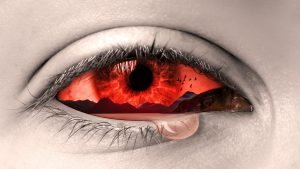
We rolled out of our cave, grouping at its red rim. One by one, we rushed down, over the peak of the hill, leaping across the soft-edged crevasse to land on the pointy cliff at the edge of the world. There we hesitated, waiting.
“This is it,” said our leader. The first out of the cave. The first off the edge of the world.
And one by one we leapt, falling down, down, down in a slow, steady beat onto the soft world below, bleeding into the fibers. Our salt comingling. Our five-second lives sacrificed in the name of sorrow.
* * *

About the Author
A Humphrey Lanham is a fantasy, science fantasy, and YA writer. They read and write a wide range of fiction but prefer strong female characters who refuse to cater to patriarchal social structures, expectations of romance, or cultural gender norms and stereotypes. They are chair of Wordos, an internationally renowned writers’ group based in Eugene, Oregon.
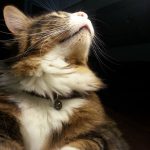 Ru, their cat, is an anthropologist studying humans and their strange proclivities. They speculate that Ru is actually an alien xenobiologist, but everyone keeps telling them that he is just a common Earth cat.
Ru, their cat, is an anthropologist studying humans and their strange proclivities. They speculate that Ru is actually an alien xenobiologist, but everyone keeps telling them that he is just a common Earth cat.
You can follow their adventures on Twitter @ahumphreylanham and @thecupcakebeast.
The Far Side of the Ocean
by Lena Ng
 “Meyxtle held the bag with three tentacles and closely studied it. The corners were crisp, no scuffing on the sides, no bite-marks or bruises.”
“Meyxtle held the bag with three tentacles and closely studied it. The corners were crisp, no scuffing on the sides, no bite-marks or bruises.”
“Let me refill your cup, dear,” said Meyxtle, as she poured from the refined bone china teapot. The smell of seaweed from the warm, salt tea wafted into the room. “Take a snack as well.” She moved the bucket closer to the edge of the table.
Crystix studied the pile of moving crabs as they clumsily climbed over each other. “Looks delicious.” She delicately wrapped a tentacle over the top crab—since manners dictated she didn’t dig into the middle of the pile and pick the fattest, reddest one hiding beneath its brothers—slipped it under her mantle, and into her beak. “Sorry about the mess,” she said as she crunched down, leaving bits of shell on the oyster couch.
“Never mind,” said Meyxtle, as she crunched on her own crabs.
The doorbell rang. Meyxtle slithered off the couch and slimed her way to the door. She signed the clipboard using a jet from her ink pouch and brought the package into the lovely sitting room. Her suckers gripped the box and she easily tore through the packaging. “Finally, it came.” She showed off her purchase.
“Nice,” exclaimed Crystix. Reverentially, she touched the handbag. “Baby soft skin.”
Meyxtle held up the handbag to one of her large eyes of her mantle. She examined the handbag from every angle. The skin was thin and a pale pinkish-white in colour. “I got a good one. No moles, no scars…wait…” She noticed a subtle discoloration. “Looks like a birthmark.” She opened the handbag and read the accompanying card. “Since each bag is made from a unique skin, individual variations in skin tone and texture may occur.”
“How did you ever afford it? Designer leather bags are expensive enough, let alone an exotic.” Crystix grabbed a crab that was scuttling on the seaweed-carpeted floor. “Aren’t they endangered?”
Meyxtle held the bag with three tentacles and closely studied it. The corners were crisp, no scuffing on the sides, no bite-marks or bruises. “Oh this one wasn’t wild. It was farmed.”
“They can farm humans now?”
With the tips of her tentacles, Meyxtle twisted the bag’s turn lock and looked inside. “Actually, I heard it’s pretty easy. You throw a bunch of them in an enclosure and nine months later, you have more of them. If you feed them, they continue to multiply. Whereas, in the wild, there’s more of a chance of damaging the skin at harvest time.”
Crystix’s eyes glowed with envy. “Their skins are so soft. Like a pig’s. But more delicate.”
Meyxtle rested the bag on the coral coffee table. She crunched on another crab. “I heard they taste pretty good, too, when they were abundant enough that we could eat them. I hope they don’t just take their skins. It would be waste of the meat to dispose of it.”
Crystix nodded with her bulbous mantle. “A big waste.”
The two females cooed as they sipped their tea and admired the human-skin handbag.
* * *

About the Author
Lena Ng is from Toronto, Ontario. Her 2018 publications include: Polar Borealis, Spectacle, Enchanted Conversation, ARTPOST, NonBinary Review, Amazing Stories, and the anthology We Shall Be Monsters. “Under an Autumn Moon” is her short story collection. She is currently seeking a publisher for her novel, Darkness Beckons, a Gothic romance.
Zoo
by Ellen Denton
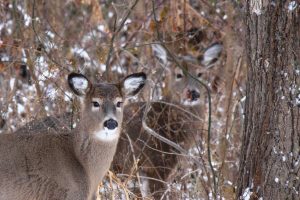 “The deer, in unison, stopped what they were doing and lined up in a row across the front of the house. They stood there looking directly into my eyes.”
“The deer, in unison, stopped what they were doing and lined up in a row across the front of the house. They stood there looking directly into my eyes.”
Last week, herds of deer started coming to my yard. They’re not afraid of me; when I tap on the window to get their attention, they don’t act startled or nervous even though I’m only a few feet away. When I speak to them through the glass, their ears twitch and they look at me with intelligent, almost friendly eyes.
When they’re not there, I can still see their tracks, like words of a secret code written by hoof prints in the snow. I like to think they’re telling me, in a winter language spoken with their feet, “We’re still here. We’re watching over you.” They make me feel less alone and remind me of all the ethereal beauty in the world.
One morning, I was looking at them through the big picture window that faces out onto the yard. They were scattered around, some of them reclining in the snow, others nibbling leaves from the lower branches of evergreen trees, a few nuzzling the ground in search of buried vegetation.
I left for a while to finish reading a book. I was saddened by it because it was a love story and both the hero and heroine were killed at the end. After I closed the book, I walked back to the window in tears. The deer, in unison, stopped what they were doing and lined up in a row across the front of the house. They stood there looking directly into my eyes.
* * *
This type of thing started about a month ago. Living creatures of all kinds would come and interact with me.
The first time was when a spider descended from the ceiling on a thread-thin filament of silvery web. I was sitting in a recliner reading, raised my eyes, and it was inches from my face. I lurched backwards with momentary disgust and fear. It was light brown in color and large enough for me to clearly see the spindly segments of its body.
I was going to duck below it so that I could get out of the chair without touching it and go get a vacuum cleaner to suck it and the web strand off the ceiling, but its dot-sized black eyes turned green – a reflective green like a mirror – and this snagged my attention.
It then started spinning around at the end of the thread. Then it faced me again and began waving its legs up and down as though they were fingers on a keyboard, then it spun around again and continued going through that alternating sequence for about two minutes. I know it sounds silly, but at the time, I felt like the spider was doing a happy dance at the sight of me.
It finally rose back up to the ceiling by absorbing the strand of web back into its body. I didn’t know spiders could do that.
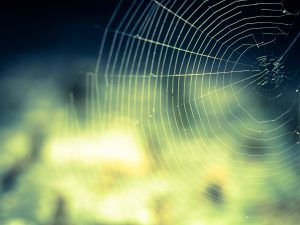 “My initial thought was to get a broom and gouge it out of the corner, but it was pretty, like a shimmering circle of snow crystals or jewels, and it wasn’t really doing any harm, so I decided to leave it for the time being.”
“My initial thought was to get a broom and gouge it out of the corner, but it was pretty, like a shimmering circle of snow crystals or jewels, and it wasn’t really doing any harm, so I decided to leave it for the time being.”
The ceiling was well lit by a carousel of bulbs, so when I looked up, I could clearly see a bridge of silken strands stretching across it. The spider traveled along one of them towards the corner, which contained a beautiful, circular web. There were other spiders on the web too, gliding back and forth along the strands and making more.
My initial thought was to get a broom and gouge it out of the corner, but it was pretty, like a shimmering circle of snow crystals or jewels, and it wasn’t really doing any harm, so I decided to leave it for the time being.
I was curious though about the odd motions of the spider when it hung before my face and the way its eyes turned green, so I grabbed a book on insects I remembered seeing in the other room. I didn’t find anything that talked about those things, but did come across an interesting chapter called “Strange and Amazing Facts About Spiders.”
I read through it. It had things like:
“Spiders have blue blood.”
and
“The silk in a spider’s web is so strong, that a web just a few inches thick could stop a cannon ball in flight.”
and
“Spider webs are not passive traps. Instead, because of electrically conducive glue spread across their surface, webs spring towards their prey.”
As I read further and further down the list, with each new fact getting creepier rather than more interesting, I would glance nervously up at the ceiling, trying to decide if the web had gotten larger or was moving towards me since the moment before when I last looked at it. It really hadn’t, but I did feel compelled at that point to get that broom.
The next day, there was an occurrence with a big cockroach-like thing. It was crouched over a crumb, but when it saw me, skittered across the kitchen counter toward the very edge of it, stopped dead in its tracks, and just stood there facing me. The antennae on top of its head started vibrating so fast, they became a solid blur of gray. I felt sick to my stomach at the sight of it, but it finally skittered off somewhere.
Later that same day, a butterfly landed outside on the window glass. When I came up real close to it so that I could get a better look, it started dreamily wafting its wings back and forth as it clung to the glass.
There were other things with insects over the next few days, some of it creepy, some of it just strange – like a thick ant trail that poured into my house through a crack in the wall. Normally, when I’d come across one of those, they’d be traveling in a line from the outside to some bit of food on the floor or in my trash, but these ants came in and formed strange, swirling designs and shapes out of the thousands of their combined tiny bodies.
I stood over them with a can of insecticide in my hand, my finger ready to push down the button and release the death spray on them, but I hesitated when I saw what they were doing. A few minutes later, they formed a trail again and went swarming out of the house through the same crack from which they’d entered. They had funny little blue dots on their backs that I’d never seen before on ants.
The following week, it started to happen with larger life forms.
There was, for instance, an occurrence with a woodpecker. It tapped on the ledge right outside my window, then fell silent as I tapped back at him. We kept taking turns tapping back and forth to each other before he flew off.
Once, a whole flock of blackbirds in flight descended and circled my house over and over, before taking to the sky again. They flew low enough to the ground for me to see them through the window, and their muffled wing beats sounded like a magician shuffling a deck of cards.
Following this were instances with chipmunks, squirrels, a few rabbits, a raccoon, and some animals I’m not familiar with.
* * *
My house is in the woods, with no one who lives close by, at least that I’ve ever seen, so I was genuinely surprised when dogs and cats started showing up. Domestic animals normally don’t wander about in the woods.
The first one sort of looked like a French Poodle and she had three puppies with her. They sniffed around in the snow and at the door, and then ran to the big picture window. The puppies all started barking at me.
Last week the deer showed up for the first time, lingering long through the day or sometimes just stopping briefly before moving on. Often a doe would come right up to the window with a fawn and look into the house at me, their faces just a few inches from mine with only the window glass between us.
* * *
Two days ago, I regained my memory. Previously, I had very little recollection of my life prior to about five or six weeks ago, but the other night, I glanced upwards, and the shock of more glittering webs scattered across the ceiling and making their way down the walls snapped me out of the amnesia.
The only thing I can’t recall is how I got here. I’m hoping that comes back to me too, but even if it does, I won’t write about it, since I don’t think there’s much of a chance anyone will ever get to see it, or see any of this that I’ve already written. I’m pretty sure I know now though why the only window in the entire house is the one that faces front, and why it will not break. I tried smashing a chair through it, and the chair broke instead of the window.
The deer are gone now too. Late yesterday, a large, strange-looking creature with a horn at the center of its head came lumbering by and scared them off.
The thing that concerns me more than anything else though is that the spider webs are getting larger and so are the spiders.
Yesterday, the webs started stretching down towards the bottom of the walls and each spider is now about the size of my hand, covering the ceiling in a sickening blanket of spider torsos and legs. If I get too close to one of the webs, it bulges out at me. Whenever that happens, the spiders in the room stop skittering around all at once and turn to me, as though watching to see what’s going to happen next, so I have to quickly get away from the wall. They then resume swinging from web to web, like little eight-legged monkeys.
If I try to gouge one of the webs away with a broom, all the spiders converge on that one spot and quickly spin another. One even came down the wall and scrambled across the floor toward my foot. I smashed it over and over with a cast iron frying pan until it was nothing but mush. None of them tried to approach me again after that; they just hang there from their webs on the ceiling and up and down the walls.
I’ve searched every inch of this house looking for a way out of it, but there is none.
* * *
Today, a horror beyond my wildest dreams occurred, and I have lost all hope.
There was a terrible blizzard overnight, which blew down a sign that must have been attached to the front of the house. There were three words on it, but I could only make out the word “The” at the top and “House” at the bottom. The middle word was covered over with snow.
I was terrified that when the wind blew off that bit of snow, the whole sign would read “The Human House”, and my worst and craziest fears would be realized – that I had somehow been abducted and placed in an intergalactic zoo of some sort where animals were the observers and humanoid-type entities were the displays – that I’d been placed in only a replica of a real house, the same way that animal habitats in zoos are often made to look like they do in nature – that the creatures that came to my window, or crawled in and out through cracks in my walls, considered me no more than a dumb, strange looking beast, the way children on field trips gape at things – that I would have to adapt to living the rest of my life in this cage, the way prisoners serving life sentences do.
I wondered why, if I was supposed to be a display, those horrible spiders were let in here, getting bigger by the minute, and now dripping this awful white mucus from their mouths as they hover above me from their webs.
* * *
Things turned out to be far worse though than I could have ever conceived in my wildest imaginings, and I have never felt as paralyzed with fear, as small, or as utterly unimportant and insignificant as I do right now.
The sun warmed the woods up enough for that little patch of snow to melt off the sign.
This isn’t “The Human House” exhibit. It’s “The Spider House” one!
* * *
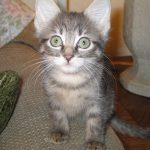 About the Author
About the Author
Ellen Denton is a freelance writer living in the Rocky Mountains with her husband and three demonic cats who wreak havoc and hell (the cats, not the husband). Her writing has been published in over a hundred magazines and anthologies. She as well has had an exciting life working as a rodeo clown, a Navy seal, and an exotic dancer in the crew lounge of the starship Enterprise. She was also the first person to scale Mount Everest to its summit. (Writer’s note: The one-hundred-plus publication credits are true, but some or all of the other stuff may be fictional.)
The Mountain Farmer’s Bootlace
by David Sklar
 “Are you a good mouser? I have an infestation—mice or something—at the top of that mountain in the east. If you’d like to hunt them for me I’d be mighty grateful.”
“Are you a good mouser? I have an infestation—mice or something—at the top of that mountain in the east. If you’d like to hunt them for me I’d be mighty grateful.”
Once upon a time there were three cats who lived in a boot that belonged to a giant. Now, this giant had a small farm, stretching over about half a continent, where he grew mountains. You might not think of mountains as a crop that grows on a farm, but if you are large enough and patient enough, you can grow them, and I’ll tell you how:
You start with a mountain seed, which is a special kind of stone, slightly bigger than you are, and shaped like a kernel of unpopped corn. Hold this stone between thumb and forefinger, and push the pointy end down into the rock. Keep on pressing down, down, down into the Earth’s crust, until the tip of it just punctures the mantle. The magma spills up from under the mantle, swells into gaps in the crust, and pushes the mountain up from the rock over the course of thousands of years. And that’s how you grow mountains.
* * *
Now, this giant had been working barefoot in the fields when he came home and found a small family of cats inside his boot. Curious, he shook the boot to see what would happen.
The calico cat climbed up the leather inside the boot, trying to escape—but the shaking made her lose her grip and fall. She landed on her feet in the heel, and scampered into the toe, where the tabby cat had been hiding since the giant picked them up. But the black cat saw the enormous bootlace dangling inside the boot, and she had to play. She latched her claws into this string and bit the tip of the bootlace, and when the giant pulled it up the cat came with it.
“Well, you’re a brave one,” the giant said as he pulled the cat out. “Are you a good mouser? I have an infestation—mice or something—at the top of that mountain in the east. If you’d like to hunt them for me I’d be mighty grateful.”
The cat did not want to leave her brother and her sister behind, but the infestation of mice sounded delicious. “Yum,” she said. And the giant carried her to the distant mountain and placed her gently on top to hunt the mice.
Now, giants’ eyes are wonderful for seeing large things far away—but not so good for details on mouse-sized things—or even goat-sized things, for that matter. Indeed, if the black cat had not mewed and played with his bootlace, the giant might not have realized she was a cat, but mistaken her for some other creature instead. So when the black cat arrived on the mountaintop, she searched and searched for mice, but the only creatures she found were a herd of goats.
She tried to catch a mountain goat once or twice, but she had no luck, and in the end she set off down the mountain alone. She saw a plume of chimney-smoke rising up from a house at the base of another mountain. She wandered for days until, thin and starving, she reached that house, where a farmer and his family took her in and nursed her back to health.
Meanwhile, the giant went back to his boot and shook out the calico cat and said, “Your sister has not caught the mice I sent her to hunt on the mountaintop. I see that you know how to climb. Do you think you can help?”
“Of course,” said the calico cat, who was afraid for her sister, and missed her dearly.
So the giant took the calico cat to the mountaintop and deposited her there. And the calico cat searched high and low for mice, and for her sister the black cat, but she found neither—only goats. So she walked down the mountainside and followed the chimney-smoke to the cottage, where she showed up worn and haggard, and they nursed her back to health, and the two cats nestled together on the windowbox in the sunlight.
Meanwhile, the giant returned to his boot, having no idea that a third cat remained in the toe—for the tabby cat had always hidden himself so well. So the giant put his boot back on with the cat inside.
Luckily, the boot fit him well, with extra room in the toe, and the tabby cat found a warm place to sleep between the giant’s big toe and his next one (which was also quite large but not a big toe by name), and the cat was comfortable there.
But one night the giant could not sleep because the goats on the mountaintop were bleating too loud. As patient as he could be about growing mountains, he got grumpy when someone disturbed his sleep. So he flung his boot at the mountaintop, and mumbled something about that infernal squeaking, completely unaware that there was a cat inside his boot.
Of course, being half asleep, he missed by a mile, or possibly even a mile and a half, and the boot bounced off of the crest of a neighboring mountain, and it settled even higher up, on the icy peak of a third.
When the boot was no longer moving, the poor tabby cat stumbled dizzily out of the toe, and walked up toward the opening to make sense of his surroundings. But before he could get outside, his movement shifted the weight of the boot, and the whole thing began to slip on the mountaintop ice. The cat held on for dear life as the old boot rode an avalanche down the mountainside, coming to rest at last against the backside of the cottage where his sisters now dwelt.
The cushion of snow was a fortunate thing, for it kept the massive boot from cracking the cottage in half with its weight. But it nearly buried the cottage. The farmer and his two daughters had to climb out the windows and shovel a path to the door, while his wife stayed inside and made something hot to drink, and their young son stayed in and played with the two cats.
While they were shoveling out their door, the farmer and his daughters noticed the face of a tabby cat poking out through a hole in the snow. And so it was that the tabby cat was reunited with his sisters, and the farmer and his family gained an enormous boot in their yard, which they used to store root vegetables in the winter.
And they all lived happily ever after. Or they would have, except that the giant was still out there looking for his boot.
Because the boot was covered in snow, he had walked past it two or three times already, giving the farmer and his family time to stock it completely with beets and rutabagas, turnips and parsnips, and the boot remained hidden in the snow until one day the farmer stamped snow off his boots before going in to get a parsnip for his soup, and that stamping shook a bit of snow off the ankle. So it was that, on the fourth or fifth pass, the giant noticed his boot sticking out of the snow, and he picked it up.
And what a thrill awaited him on that day! For instead of a family of cats who never did deal with his infestation, he looked inside and saw a cache of root vegetables that seemed just the right size for an afternoon snack. So he upturned the boot above his mouth and ate them all in one gulp, leaving the farmer and his family with nothing to eat for the winter.
The farmer was distraught, and he had no idea what to do. The winter stretched out long before them, and they had just enough food for a week. And his daughters and his wife felt hopeless as well.
But the youngest child said, “I will go and find the giant, and make him pay us back for the food he took.” And his father told him no, and his mother told him no, and his sisters told him please don’t, and the black cat told him, “If you go then I’m going with you.”
And when everyone else was asleep, the farmer’s son went out in the snow to track the giant, with a sandwich, a bit of kibble, and the black cat riding in the pack on his back. This did not take much skill, because the footprints were almost as big around as his house. But it still was not easy, because the giant took such large steps that the boy had to run all night just to catch up. And he still would not have made it, except that the giant stopped in the morning to plant a new crop of mountains.
“Hey, Mister Giant!” the boy shouted, and he tapped on the giant’s boot.
The giant pushed another large round rock into the ground.
“Hey! I’m talking to you!” the boy shouted.
The giant did not notice, but walked a bit further, and the boy had to sprint to keep up.
“Hey!” the boy shouted, breathless, when the large foot stopped again, but the giant continued not to notice him. The cat leaped out of the backpack and grabbed the lace of the giant’s boot, where it dangled above the ground. With the greatest leap he could muster, the young lad followed, and grabbed the bootlace as well. And they swung from it until the bootlace came untied, and the boy’s feet touched the ground.
Still the giant did not notice, but went his way, dragging the boy across the stone terrain with every step. “There are trees over there,” the cat said. To get the giant’s attention, the boy ran off to the side and wrapped the bootlace several times around a pine. And this the giant noticed by the way the pine tree snagged his step before it toppled out of the ground.
“Hey!” the boy shouted again.
The giant turned and squinted down at him. “You’re not a cat,” the giant said. “And you’re not a rat. What are you?”
“I’m a boy.”
The giant scratched his stubbly chin. “Are you a good mouser?”
“I don’t know.” The boy shrugged. “I’ve never tried.”
“Then probably not,” the giant told him. “What do you want?”
The boy felt a quivering in his chest that nearly stole his voice away, but he answered anyway, “You took something of mine.”
The giant looked around, puzzled. “Was that your tree?”
“No,” the boy answered. “My family’s root vegetables. The beets, parsnips, rutabagas, and turnips you ate from this boot.”
“Those were yours?” the giant asked.
The boy nodded. “Uh-huh.”
The giant shrugged. “Why were your roots in my boots?”
“We didn’t know it was yours,” the boy said. “It came to us with a cat. We were using it as a root cellar.”
“Did anyone buy?” the giant asked.
“Buy what?” the boy asked back.
“The roots, from your root seller.”
The boy shook his head. “They were all we had. They were supposed to feed us all winter.”
At this point the cat tugged on the boy’s pants. “Tell him you’re a good mouser,” the cat told the boy.
“He already said I wasn’t,” the boy said back.
“Tell him you’ll try,” said the cat.
“What are you talking about?” asked the giant.
“I can try being a mouser, if you need me to,” said the boy.
“But you’ll need a tool,” said the cat.
“But I’ll need a tool,” said the boy.
“What kind of tool?” said the giant.
“His bootlace,” the cat whispered.
“Your bootlace,” said the boy.
So the giant thought a minute, then pulled out his bootlace. He then took the boy, not even noticing the cat who rode along, and deposited the boy and the cat on the mountaintop with the goats.
* * *
Meanwhile, back at the farm, the boy’s family wondered if he would ever return.
“He probably got eaten by the giant,” said his mother. And she shed a tear, because as tough as she tried to be, she loved her children and she did not want to lose them.
The boy’s sisters watched the two cats play lethargically in the sunlight. The girls missed their brother, and the cats missed the other cat.
And then it was that the boy and the cat rode in on the back of a goat, with a dozen more goats harnessed behind them with a giant bootlace. “We’ll have milk for the winter. And cheese,” said the boy. “And meat, if we get really hungry.”
But his sisters and his parents only ran to him and hugged him, so glad they were to see the boy alive. And the cats ran up and rubbed against his shoes, and then they leaped up onto the back of the goat to welcome their sister home.
* * *
Originally published in Cosmic Roots and Eldritch Shores.

About the Author
David Sklar never learned to drink coffee until he had kids. A Rhysling nominee and past winner of the Julia Moore Award for Bad Verse, he has more than 100 published works, including fiction in Nightmare and Strange Horizons, poetry in Ladybug and Stone Telling, and humor in Knights of The Dinner Table and McSweeney’s Internet Tendency. David lives with his wife, their two barbarians, and a secondhand familiar in a cliffside cottage in Northern New Jersey, where he almost supports his family as a freelance writer and editor. He’s also the creator of the Poetry Crisis Line, which features new material every Monday and Thursday at poetrycrisis.org.
The Turn of the Year
by Gerri Leen
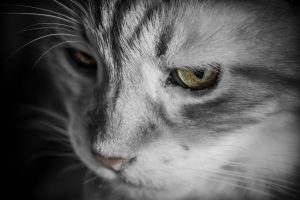 “You cannot in all fairness deny him. If you choose, you must choose him. If you refuse him, he will challenge whomever you do choose, and you don’t think any can stand against him.”
“You cannot in all fairness deny him. If you choose, you must choose him. If you refuse him, he will challenge whomever you do choose, and you don’t think any can stand against him.”
Snow trickles into the barn, blown by winds grown suddenly gentle after gusting all night. You can hear the sound of festivities from the castle: the humans are preparing to welcome in another year with dances, great spreads of food and drink, and embraces when the clock strikes twelve. There’s no clock in the barn, but you’ll know exactly when the year slips over: the sense of potential will build as the minutes tick down and then be gone again until next year.
You turn away from the cold, feeling it despite the lushness of your fur. Your joints ache as you move and you want nothing more than to go up to the castle and lie in front of the kitchen stove, but you’re expected down here. Kittens and half-grown cats circle around you, their tails up in the universal cat-sign of friendliness, their hopeful faces beaming silent messages of: “Choose me. Choose me.”
It’s New Year’s Eve, the night you can choose to change, and there are more candidates than last year even with the storm.
They look so appealing—they feel even more so with their spirits strong and their energy high. You can barely remember your first incarnation, when you jumped at the least sound, your back arched, your tail like the sword you’re known for carrying.
You don’t carry it anymore—and you think that disappoints the clowder. They know your body is worn and scarred and that it’s time.
Truth to tell, it’s long past.
Lilac meets your eyes and her look is knowing as she glances at one young cat in particular—a lithe buff tabby with stunning turquoise eyes. Tulip is her son. She has prepared him despite the cost to her and her bloodline.
To be the vessel of “the Puss” is an honor, after all.
Your boots hang with your sword, just above the shelf you like to sleep on, the one that gets sun no matter the season. It’s been so long since you last wore them, when you fooled an ogre and a king and made your person rich and loved. A favor he never forgot nor did his heirs—the care of the estate cats is written into every will. You’ll always have a home here even if the latest marquis doesn’t know it’s really the famous “Puss” in this old gray body.
You were a brown tabby when you wore the boots. You’ve been so many other colors before and since: a longhair white, a black and white shorthair, solid black, silver striped, even once the seal brown and tan of a cat from the exotic east. In the early days you preferred to be striped, to mimic the wildcat and take advantage of its natural camouflage when you went into battle. It’s been some time since you battled anything more dangerous than a rat. But you could fight again, if you choose the change. Your body wears out, but your soul—your gift of language and cunning—does not. All your experiences come with you when you jump to a new vessel.
You have no idea how it works. It just does. Probably a fairy somewhere was behind it. Everything seems to happen because of them.
The kittens dance and mock-fight with each other, and they raise dust that makes you sneeze.
“Bless you, great one.” Tulip walks over, his stance assured. He knows he’s the most likely choice to be your new vessel. He will consider it an honor to die and make way for you.
“Walk with me,” you say, and he stays close, his head bumping against yours in a way few who know you ever dare.
You love this cat. Have loved him since he threw himself between you and a garden snake, his kitten body puffed, his half-saber tail up in perfect battle-cat form. Neither you nor Lilac had the heart to tell him the snake wasn’t venomous. Let him think he saved you.
This is his last year to be eligible. You only take the youngest, those under two. Before life has begun to mean too much, before they get attached to other cats and people and even dogs and horses and other mean creatures. It’s a rule you’ve made for yourself: if you must steal bodies to fulfill whatever strange destiny demands you remain on this Earth, you will do so with as little damage as possible.
The cats whose bodies you take move on and get another chance, or so you assume. You cannot bear the thought that you’ve robbed them completely of life. None have ever come back to tell you it is or is not so, but perhaps they incarnate somewhere else, far from their old bodies.
“I stand ready,” Tulip says, and his voice doesn’t shake as some of the other candidates’ have over the years.
You cannot in all fairness deny him. If you choose, you must choose him. If you refuse him, he will challenge whomever you do choose, and you don’t think any can stand against him.
But you don’t have to choose. You should have changed last New Years, mere months after he “saved” you from the snake. But you couldn’t bear to. Even if everything in you said it was time, that your current body was nearly useless to you. Even then Tulip was the best candidate, young and green though he was.
You walk without talking, and he keeps up easily, not hanging back the customary head length. You always seek him out when you visit the barn, and all the other cats know he’s your friend, and with that title comes great honor.
You know he considers you a friend, too. You have not, over the lifetime, had many of those. Loss is a hard thing if you can never escape the cycle of the seasons, so you’ve learned to keep to yourself. Lilac managed to creep past your defenses; it’s little wonder her son has too.
“I can last another year,” you murmur. Normally there is no discussion. You choose or you do not.
“You can’t last.” Tulip’s voice is strong, his faith resolute. He thinks he wants this.
You imagine the kittens he will father. Fine, strong, and brave. Beautiful like he is. Cunning like his mother. You, in his body, could never replicate that.
You’re a terrible father. You’ve learned this over the lifetimes. But is it heartless to not want to get too close to a kitten you may eventually kill? Even if it’s for destiny’s sake? You’ve stopped fathering litters on the estate and go far afield for that sort of pleasure. Or did—your wandering days are over for now.
“I’m not dead yet,” you mutter and Tulip sniffs, derision clear.
He’s never been afraid to speak plainly.
“What is there to fight anymore—to be strong for?” you ask. “There’s peace in the land and our human is respected and treats us well. I can afford to wait another year.”
“So that you don’t have to take me?” He slaps at you, and you would push him under your paw and hold his head to the straw as the Puss should any cat who dares offer such disrespect, but you lack the strength.
You do stop walking. You turn and glare, fixing him with the stony expression that’s made more than one tom roll and show his belly.
Tulip only looks angrier. “What happens to you if your body wears out? You can only make the change on this night.”
You’ve considered this. “Then I will die. As maybe I’m meant to.”
“You’re not meant to. You’re the Puss.” Tulip sits and stares at the ground. “I am the right choice.”
“I know. That doesn’t mean I will choose you.” You turn and leave him, walking to the door and staring out at the snow that’s drifted up against the side of the barn. In a young body, you would bound through the white fluff up to the banquet hall to steal food from the great table. In this body, you will feel the cold like fire on your paws if you try to make the walk tonight.
You feel a presence at your side and can smell Lilac, her sweet scent filling your nose. “Are you going to lecture me, too?” you ask her, sounding as surly as any ancient tom.
“No. It’s possible I knew you would do this.” She digs daintily at the snow. “The time draws close.”
You can hear the candidates muttering. You should have announced your choice—even if it was no choice—by now.
You nuzzle her gently, then turn to them. In your best voice you say, “I will keep this body another year.”
You see relief on the faces of some of the cats who will cycle out of eligibility. You see confusion and disappointment and maybe gratitude for more time on the faces of the others.
On Tulip’s face, you see only anger. He stalks to you, hissing at the others until they scatter to the far reaches of the barn and only Lilac remains. “You will die. And everything you are, everything you mean, will be lost.”
You dip your head down and rest it under his chin. It’s a sign of appeasement, the only one you can give him.
Because he’s right. Everything you are might be lost. But it occurs to you that undergoing change after change may have robbed you of what all these others live with daily.
The beautiful uncertainty of life.
Tulip presses his chin down and you can feel his purr—but it isn’t a sound of happiness; it’s one of self soothing. He’s upset. With you, with a future he did not expect to have, possibly with himself for not being more convincing.
“Stay with me,” you whisper. “Learn from me. If I die before the next change, you will be my replacement and will pass on what I know to others. If I last till next year, then after the change you’ll still be my friend, and we can chase each other through the snow.” It’s the one thing you wish you could do tonight.
Play. Be young. Be strong.
You’re giving that up and you feel the sense of destiny hammering at you, but you ignore it.
Not this time. Not this one.
The kittens hover at the edges of the barn, as if you might change your mind. Tulip stays close, too, but you see resignation in his eyes.
Lilac, however, lies down in the deep straw and folds her paws underneath her. She gives you a long, deep eye-blink of love—and gratitude, you think—as the New Year dawns around you.
* * *
Originally published in Enchanted Conversation.

About the Author
Gerri Leen lives in Northern Virginia and originally hails from Seattle. In addition to being an avid reader, she’s passionate about horse racing, tea, and whisky, and her latest obsession is ASMR vids. She has work appearing in Nature, Orson Scott Card’s Intergalactic Medicine Show, Daily Science Fiction, Grimdark, and others. She’s edited several anthologies for independent presses, is finishing some longer projects, and is a member of SFWA and HWA. See more at www.gerrileen.com.
Charlie at the End
by Frances Pauli
 “He races, turns, loops back and realizes he is circling them. He is dog and they are pack. He is alone.”
“He races, turns, loops back and realizes he is circling them. He is dog and they are pack. He is alone.”
The streets of men fall silent long before Charlie slinks from his master’s side. There is no movement in the house for days, not even when he cries or pees the carpet. No more breath lifts the man’s body, no life remains, and Charlie’s loyalty falters as his belly empties.
As the body begins to smell like meat.
He tears the screen from the bedroom window, squeezes out, and runs with silver strings trailing from his claws. The pattering echoes as he goes. No other sound competes with Charlie’s flight. No one shouts or whistles. Not a single car horn blares anger when he crosses the wide street and lopes past silent storefronts.
He scents as he runs, nose skipping along the pavement like a stone on water. His ears swivel to either side, twisting and alert for any sound, for anything at all. He finds the first bodies after only another block. He smells them long before buzzing flies sound the alarm.
The people lay where they have fallen, twisted and with their hands open as if clutching something that isn’t there. Their eyes are wide and staring so that Charlie cannot help but growl. His throat rumbles at each dead stranger. The fur along his spine lifts and his heart beats, danger, danger.
He smells the flesh, sweet and overpowering, but there is a sharpness behind it. He cringes even while his tongue lolls. The man has not fed him for many days, will never feed him again. The people in the street all stare at the sky, and Charlie knows he is alone. He whines, lowers his tail to the earth and scoots far around the next, reaching corpse.
Now he clings to the buildings as he goes. The streets are choked with the dead, and Charlie rubs at his nose with one paw and shakes as if to dislodge the odor. He sits beside still glass and pants at his own reflection.
In the distance, a howl rises. His ears stand at attention. His tail thumps once before remembering to be afraid. His body cringes, belly tight to the ground, but he cannot stay away and slinks between the buildings with his ears tuned. Each time the sound comes, Charlie eases closer. He crosses streets, weaving between the dead. He follows alleys where the scent of garbage is a relief from the stench of decay. And more. The sharp odor troubles him. His nose flinches from it, insisting there is danger there.
Charlie finds the other dogs and wishes he hadn’t. He lingers at the alley’s mouth and watches them drift between the corpses. Their bodies are lean, showing angular bones beneath dull pelts. They had no master, have been alone much longer. Their hunger is enough to dare the smell. He sees it, in the curling of their lips and the dark stains growing over their teeth.
Danger.
He runs from them. Charlie darts from alley to alley, sticking to the familiar reek of cast-off human things and only entering the streets when the way ends and he must cross to the next slim sanctuary. He hears the dogs’ snarling long after he’s left them behind. He sees their dripping jaws even with his eyes closed.
He races, turns, loops back and realizes he is circling them. He is dog and they are pack. He is alone. He has nowhere else to go. His pads brush against asphalt. His nose twitches. The garbage is fresher here, but there is something else behind it. A scent that is neither death nor rot.
Charlie stops and lifts his nose high. His tail swishes, wagging joy at the new aroma. He follows it, a better chase than circling the starving pack, a more noble quarry, and one that doesn’t push his belly lower. The thread of something fresh and edible draws his feet between the buildings, up another alley to an open door in the rear of one storefront.
The smell lives here. Charlie slips inside without hesitation. His tail thumps against the door, wagging in anticipation. He creeps farther, following his nose while the smell sings to his belly. There are shelves inside, a maze of cans and boxes. There are glass doors along the walls, and in one corner, a bucket full of water.
Charlie drinks. His tongue uncurls and hangs soft again and happy. He finds bread on a low shelf, and whimpers before remembering there is no master. A pang of guilt still lowers his head as he steals the loaf. He still cringes as his teeth tear into the plastic, as he rips the bag with his claws and then eats both bread and garbage in his haste to be full again.
It is glorious. Soft and tasting of man’s things. Charlie eats two loaves before heaving. He devours his own sick, drinks again, and curls up between the shelves to sleep.
When he wakes, the cat is there. She sits atop the shelf, glaring. When Charlie barks, she turns away, shows him her butt, and flicks her tail dangerously over the edge. It is a dare he doesn’t take. Charlie remembers cats. He whines and puts his paws over his nose, but his tail thumps. He is not alone. Even if she is a cat.
She ignores him. He pretends not to watch her. She catches him and hides behind the counter to punish him. She has food there. Charlie can smell it, but he knows better than to expect a cat to share. He eats the bread, tears open a few bags of dry crunchy things, and waits for the cat to come back and glare at him some more.
They live together in the store for two days before he wakes up to purring. His belly vibrates with it. The cat sleeps curled up beside him, hind end to his face and long tail tickling his muzzle. When his tail thumps, she slaps it. Pin claws prickle the sensitive skin but Charlie loves it. No one has touched him since his master stopped moving. He holds still as a stone and lets her sleep in peace.
Charlie lays his head on his paws and dreams of the master. The cat is back on her counter when he wakes, but he can feel the difference. Even when she glares.
They eat together, the cat behind her counter and Charlie picking from the packages he can chew his way into. They haunt the shop by day, the cat sitting in the front window and Charlie guarding the back door. He fears the other dogs now. Now that he has something to protect. At night the cat sleeps by his side, alternately clawing his tail and grooming him with her rough tongue.
The water in the bucket is gone, but there has been rain. He only has to wander to the alley to drink. Eventually, the shelves will empty. Charlie imagines leaving with the cat, finding another store, a full bucket and more bread. He wanders to the end of the alley when the puddles dry up. He finds the first dead dog there, eyes staring at the sky, paws stiff and reaching.
Charlie growls at it. His tail drags. The sharp smell is in his nose again, and he whines and paws at his face. He shakes, steps around the corpse, and ventures into the streets for the first time since finding the cat.
All the strays are dead. They lay beside the remains of man, a gaunt, furry echo of the other death. There are birds as well, corpses of crows and rats. The sharp smell overpowers even the scent of rot, and Charlie backs from it, turns tail, and races back to the shop’s shelter.
He barks for the cat, calls the warning over and over. Danger. Danger, danger.
Charlie races between the aisles. He knocks over the boxes. He barks, whines, and doesn’t believe the cat is gone until he peeks behind the counter. A stalwart white hopper stands above the cat’s dish. The kibble is all gone. The dish is empty. He sniffs to be certain, sits, and howls to the ceiling.
He remembers cats do not need a pack.
Though he is certain she will not return, Charlie waits in the store for three more days. His tongue dries up. His belly tightens, complaining so loudly that he wakes with a start. The hunger aches again and, eventually, Charlie slips through the back door and returns to the streets.
This time he runs without dodging. He leaps the corpses and he lets their stink drive him onward, down the long avenues between the buildings, down and away from the things of man. He races until his pads bleed, until the buildings finally spread their numbers. Charlie limps past little houses then, stalled cars, and fenced yards where the bodies have been left inside, where the stink is only a whisper behind grass and metal and, in the distance, the clear bright smell of water.
He makes for that, leaving the road when it veers sharply in the wrong direction. The grass feels like heaven and memories. He longs to roll in it, but his tongue is dry and the tears in his feet feel like fire. Instead, he crosses at an angle to the wind, keeping the water in his nose until he tops a rise and can see the glinting of the pool ahead.
A house squats behind it. A high chain fence surrounds it.
Charlie digs, churning his own blood into the soil, until he can squeeze underneath. He drags to the pool and laps at green water. His belly shudders. His paws leave pink tracks around the patio. He sniffs and catches wild odors, trees and dirt and animals that never lived inside a house with man.
Animals that have never eaten the sharpness that means dying.
In the shade of the house, Charlie rests. He drinks and sleeps until he is strong enough to think of food again. He imagines the shelves of bread, sniffing at the door that won’t open. He reaches and finds the windows closed.
When night falls, he hears the howling. This time it sings away from streets and houses. It calls from the space between man’s cities, and there are many voices. Charlie’s tail wags. He squeezes under the fence, leaves the water, and trots toward the trees. The howling drifts into the fringes of man, singing to his heart and making his pain and hunger fade like smoke on a steady breeze.
He is dog and that is pack. He bounds and barks and hears a new voice from much closer.
“Here, boy!”
Charlie skids to a halt. His tail dances, frantic, in all directions. The howling comes, but now it sounds far away. Almost as soon as he hears it, the whistle follows.
“Here, boy. Come!”
His tail dances, but he lowers his head and whines. Across the grass, a man steps between the houses. Beyond the trees, the pack sings another chorus. Charlie writhes against the grass, barks and presses his belly to the cold earth.
The man eases nearer. He stops and lowers himself until their eyes can meet. Charlie’s nose catches a forgotten scent, meat that hasn’t begun to rot. His tongue loosens, lolling between his teeth. His tail thumps and the man reaches out, makes the meat an offering.
“Good boy.”
He sniffs it, brings his nose right up to the man’s fingers and finds the sharpness there. When he flinches away, the man lowers the offering, tilts his head and whistles faintly. He drops the meat and waddles backwards, taking the odor with him.
Charlie eats. The meat is dry and too salty, but he salivates at the first bite and wolfs the rest down as if it were fresh liver. Before he’s finished, the man is reaching again. His fingers curl more than they should. They smell of the sharpness, but Charlie leans into them just the same. When the man pats, the dog melts into him.
This is master. He is dog.
The man leads, and Charlie follows. They walk in the grassy space between the roads and the trees. The sun dips behind the city. A house waits at the edge of the wild. The door is open, and it smells of home inside, of life before the sharp scent ruined the world. When the man enters, Charlie’s paws move.
One step in that direction, one sniff, before he remembers doors are traps.
Charlie stalls outside that threshold. He barks, but when the man whistles, he presses his stomach to the ground and refuses to enter. The man squats inside the doorway. He sings the song of dogs and masters. He whistles, claps his hands, and brings more meat to the threshold.
They stare at one another until the man sits, dropping his head in his hands. Charlie rests his muzzle on his paws. He whines, thumps his tail. When the man throws him the meat, Charlie eats it. He longs for water, but the pool is in the past now, too. The moment, the threshold, and the man are everything.
In their stalemate, he hears the howling, far off.
Eventually, the man rises. He wanders deeper into the house and Charlie stands, tempted despite the closed windows and the door. He trembles. His ears flatten and lift and flatten again. Before he relents, the man returns. He pushes a chair through the doorway, drags the thing out of the house.
They sit together at the end. The master in his chair and Charlie at his side. When the man reaches, the dog leans in, savoring the contact but also noting the stiffness, the curling and tightening of fingers. He sees the way the man pauses every few breaths to stare at the sky, just as he hears the pack singing from the forest.
It won’t be long.
When the man is gone, Charlie will answer the howl. He’ll run, away from the streets of men, and live. Maybe he will see the cat again. She’ll glare from some high branch while his pack runs below. For now, Charlie remains. He sits beside the man. He waits while the sun sets. When the man stares at the sky, Charlie looks, too.
He hears the wind and the earth and the future while the man fades.
He is dog.
* * *
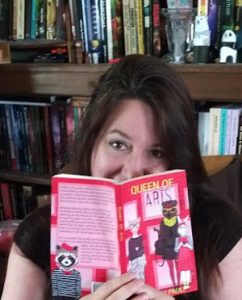
About the Author
Frances Pauli writes numerous novels and stories across the Speculative Fiction genres. She greatly prefers anthropomorphic characters, and you’ll likely find some kind of animal in just about all her fiction. She lives in Washington State with her family, a wide variety of pets, and far too many distracting hobbies.
Her fiction has won a Leo Award and been nominated for a Cóyotl Award.
For news and title updates, you can find her at www.francespauli.com.
Issue 0
![]()
Welcome to the launch of Zooscape!
Animals are among the most precious and fascinating resources in our world. Their variety extends from bizarre deep sea creatures to cuddly friends who sit on our couches hoping for a bite of your sandwich. They are the most extreme aliens we’ve truly encountered and also the archetypes we tell fairy tales about. When we tell stories about animals, we’re telling stories about ourselves, both as we are and as we could become. Furry fiction includes all varieties of stories featuring anthropomorphic animals — from talking dragons to witches’ familiars, from animal-like aliens to Aesop’s fables, and everything in between.
Furry fiction is an exciting frontier. Explore it with us.
For our zeroth issue, we have a single story for you, to whet your appetite.
* * *
Dragon Toast by Nina Kiriki Hoffman
* * *
We’ll be back every few months with more animal tales. If you’re a writer who specializes or dabbles in stories about anthropomorphic animals of any variety, please consider submitting to us, and your story could be one of them.
Dragon Toast
by Nina Kiriki Hoffman
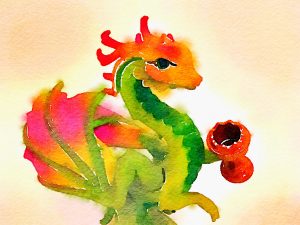 “Clovialla guarded a hoard of gold and gems in a cave behind the Falls of Forgetfulness.”
“Clovialla guarded a hoard of gold and gems in a cave behind the Falls of Forgetfulness.”
The dragon wanted to raise a toast at her first meeting with our coven, and what the dragon wanted, the dragon got. She held up a golden goblet in her claw and glared at the rest of us until we held up our mugs, teacups, and glasses.
I glanced at the other eleven members of the coven. We had gathered in the biggest room of my house’s basement, since that was a room that could accommodate a dragon. It was lit only by candlelight, so it was full of shadows. Everyone had brought stumps of candles, though, so there were lots of flickering flames, and a strong smell of earth, burning plants, and buried secrets.
Amardi, the coven leader, was an elder who had been witching since her twelfth birthday seventy years earlier. She sat at the table’s head, near the flat-topped column where our ritual objects lay — the ceremonial dagger; the small brass cauldron that hosted a fire in which herbs burned, sending up fragrant smoke of rosemary and sage; the glass bowl that held waters of the world; the cupped clay hand with a mound of earth on its palm. The other witches ranged in age from mid-sixties to late teen (that would be me). We dressed however we thought witches should dress — cone-shaped hats? Black tulle tutus? Steampunk vests and skirts? Striped stockings? Or just jeans and a T-shirt? A little of everything. (I went with all black, a ninja minus the headgear.) Everyone else was alike, though, in their expressions of fear. This was the first meeting the dragon had attended, and they weren’t sure what to expect.
Clovialla used the pointed tip of her tail to nudge me in the back. I was the only one in our coven who understood dragon, and I’d recruited her, so I was her translator, which made me happy. Words were my gift, and I loved crafting dragon speech into standard. I liked knowing things none of the others knew. I was the youngest witch in the group. The others were all spell-deep in magical theory and practice.
I was a legacy recruit. When my mother died, her spot came open, and they invited me in, not realizing that my mother had passed on none of her knowledge to me.
I had one inborn skill. I had been able to understand every kind of language from my cradle. Mother hinted she had done some dangerous spells while she was pregnant with me. Father blamed her for everything he didn’t like about me. By the time I was twelve, he had left.
Mother died when I was sixteen, long before she could tell me everything I needed to know about her and myself.
* * *
I met Clovialla the dragon on one of the many qualifying quests Amardi, the head of the coven, gave me, even though I was already a member. Once she found out about my lack of magical knowledge, Amardi said I was a probationary member. I went on the quests she gave me hoping I’d pick up knowledge and magical ingredients, and often I did.
Clovialla guarded a hoard of gold and gems in a cave behind the Falls of Forgetfulness. Amardi had sent me to get some water from the Falls. Most of the time, people who went on this quest drank from the Falls and forgot what they were supposed to do. I figured this out ahead of time and brought my own water supply.
And I found Clovialla. She flamed. I saw the fire through the water of the Falls, and I found there was a narrow path that led behind the curtain of water and into the cave. I followed it, and there I found the dragon, a vision of gold and smoke perched on a pile of treasure.
There were a lot of bones littering her cave, some of them human skulls, so I knew she ate people. But she spoke, and I understood her. “Come closer, Morsel,” she said.
“I don’t know if I should,” I said.
“What? What?” she cried, and lifted her head on her long golden neck and bugled. I had to cover my ears, even though it was a beautiful sound, a trumpet solo that ranged up and down the scale. It filled the cave to overflowing.
“I apologize if I offended you,” I told her when the sound finally died out.
“Offended me?” she said, and laughed. She crawled across her pile of treasure, crushing the more fragile items and popping gems from some of the others. I would have backed out of the cave, only the Water of Forgetfulness was at my back, and I wasn’t sure what would happen if I immersed myself in it. She was between me and the path.
Clovialla’s whiskers were long, mobile, and muscular. Their fringed ends reached out and touched my cheeks. “How is it you have the gift of tongues?” she asked.
“It’s a mystery,” I said.
“You haven’t offended me, little appetizer, but you have made it unlikely I’ll eat you. I enjoy conversation, and there has been no one in an age I could speak with.”
* * *
I brought home the Water of Forgetfulness for Amardi, who looked disappointed when I handed her the sealed jug — confirming my suspicion that she sent me on these quests hoping I wouldn’t return — and I brought home Clovialla, with her hoard on her back. The house I inherited from my mother had a deep and extensive system of basements, and Clovialla made her nest there.
She knew much of magic, and accepted me as a student. Amardi stopped sending me on quests when I demonstrated my first mastery of the element of fire by lighting our summer bonfire with a snap of my fingers.
When the coven’s oldest member died, I invited Clovialla to join the coven, and the others couldn’t say no.
“Say this for me, Snackling,” Clovialla said now as the others waited nervously. “I salute all creatures of power who work together, and I promise not to eat those in this room, who are now my sisters.”
I held up my wooden cup and repeated Clovialla’s words in standard.
Everyone else blinked and smiled.
“I’ll drink to that,” said Amardi, and we all did.
* * *

About the Author
Over the past thirty-odd years, Nina Kiriki Hoffman has sold adult and YA novels and more than 300 short stories. Her works have been finalists for many major awards, and she has won a Stoker and a Nebula Award.
Nina’s novels have been published by Avon, Atheneum, Ace, Scholastic, Tachyon, and Viking. Her short stories have appeared in many magazines and anthologies.
Nina does production work for The Magazine of Fantasy & Science Fiction and teaches writing. She lives in Eugene, Oregon.
For a list of Nina’s publications: http://ofearna.us/books/hoffman.html.
Welcome to Zooscape!
We don’t have this e-zine completely figured out yet, but we’re working on it!